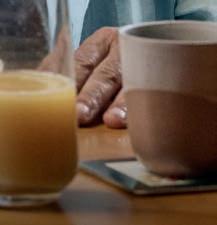















Transparency of information is one of the many key things COTA Australia has advocated on aged care reforms throughout the years. The Royal Commission into the Quality & Safety of Aged Care highlighted so many issues and revealed shocking stories of the experiences people have had. It set Australia on a path of serious and fundamental reform.
Throughout this, Council on the Ageing (COTA) Australia has consistently and forcefully advocated for aged care that is of high quality, transparent and based on aged care services that are delivered in a way that upholds older people’s human rights.
The Royal Commission accepted many of these points and we are now seeing the development of a new rights-based Aged Care Act, redesign of the support at home system to help more people remain independent in their own homes — where most people want to stay as they age — new transparent information sources like the Star Rating system, more staffing in aged care facilities and better funding for better care.
The job is not yet done, but COTA Australia remains on the case in aged care reform and in many other areas that impact on your life, like health care and employment. Tackling the impacts of ageism head-on. Ensuring that older people have the same rights — including access to good information to make their own decisions — without question.
Finding the right aged care service for yourself or assisting your loved one is one of the most important things you will ever have to do. Yet, it can be hard to find the information you need to help you make this decision.
This Guide can assist you to find and make the right decision. It is an independent resource to make you aware of options available in your local area. You can order a hard copy to browse through and share with families or friends. Alternatively, you may go online at AgedCareGuide.com.au if that’s your preference, where you can filter your searches to just those services in a local area and request a quote from the provider you select.
COTA Australia, as the national peak advocacy body for people over 50 years of age, has partnered with DPS because we both value and focus on the need for you to have good information to make choices. More than that though, AgedCareGuide.com.au gives you the opportunity to leave a review of the services — be they provided in the home, in a nursing home or a retirement village. All of us like to hear from our peers or others in the same situation about what is good, bad or indifferent when making decisions. Your experience and feedback provides more invaluable information for another person in their search and decision making.
I hope you will find this guide useful in your decision making and that you will share your experiences to help others in the same situation. We will continue the work to make aged care services better and uphold your rights in all of their interactions with you.
Wishing you all the best in finding the service that is right for you.
Patricia Sparrow CEO, COTA AustraliaAged Care Guide
TASMANIA 2024, 21st Edition
Printed June 2024
RRP $44, inc GST
Deputy Editor
David McManus
david.mcmanus@dps.com.au
DPS Publishing Pty Ltd ● 1300 186 688 ● PO Box 1026, Pasadena SA 5042 info@dps.com.au ● AgedCareGuide.com.au ● ABN 53 090 793 730 Advertising Distribution Proudly produced sales@dps.com.au distribution@dps.com.au and printed 1300 186 688 1300 186 688 in Australia
The factual material contained in this publication has been obtained from information supplied by government departments, industry and organisations, by personal interview and by telephone and correspondence. At the time of going to press the publisher believed that all information submitted for publication was accurate and complete. However, the publisher can take no responsibility for inaccuracies or incomplete information that may have been supplied to them in the course of their enquiries detailed above. The facts published indicate the result of those enquiries and no warranty as to their accuracy can be given. The information in this publication is general in nature and does not constitute financial, legal or other professional advice. Readers should consider whether the information is appropriate to their needs and seek professional advice tailored to their personal circumstances. Images within this publication may have been altered from their original format. © Copyright. No part of this publication can be used or reproduced in any format without express permission in writing from The Publisher. ® Aged Care Guide is a registered trademark.
Advocacy
CarerHelp carerhelp.com.au
Carers Australia
02 6122 9900 carersaustralia.com.au
Carers Tasmania
03 6144 3700 carerstas.org
COTA Tasmania 03 6231 3265 cotatas.org.au
National Seniors Australia 1300 765 050 nationalseniors.com.au
Older Person’s Advocacy Network (OPAN)
1800 700 600 opan.org.au
Tasmania Elder Abuse Helpline 1800 441 169 elderabuse.tas.gov.au
Your Say Advocacy Tasmania 1800 005 131 advocacytasmania.org.au
Cultural
Centre for Cultural Diversity in Ageing (PICAC)
03 8823 7979 culturaldiversity.com.au
Federation of Ethnic Communities’ Council of Australia
02 6282 5755 fecca.org.au
Migrant Resource Centre Tasmania (PICAC)
03 6221 0999 mrctas.org.au
Multicultural Council of Tasmania
03 6170 9196 mcot.org.au
Translating and Interpreting Service
13 14 50 tisnational.gov.au
Government
Aged Care Quality & Safety Commission
1800 951 822 agedcarequality.gov.au
AC Volunteer Visitors Scheme (Lifeline Tasmania)
0477 883 942 lifelinetasmania.org.au/acvvs
Department of Veterans’ Affairs
1800 838 372 dva.gov.au
My Aged Care
1800 200 422 myagedcare.gov.au
Service Tasmania 1300 135 513 service.tas.gov.au
Services Australia - Aged Care Line
1800 227 475 servicesaustralia.gov.au/ageing
Services Australia - Carers & Disability
13 27 17 servicesaustralia.gov.au/carers
Services Australia - Medicare
13 20 11 servicesaustralia.gov.au/medicare
Services Australia - Older Australians
13 23 00 servicesaustralia.gov.au/ageing
Dementia Australia
1800 100 500 dementia.org.au
Dementia Behaviour Management Advisory Services (DBMAS)
1800 699 799 dementia.com.au
Dementia Support Australia (DSA)
1800 699 799 dementia.com.au
National Continence Helpline 1800 330 066 continence.org.au
National Dementia Helpline 1800 100 500 dementia.org.au
Seniors Health Card 13 23 00 servicesaustralia.gov.au/ commonwealth-seniors-health-card
Legal Aid Commission of Tasmania Advice Line 1300 366 611 legalaid.tas.gov.au
Office of the Public Guardian 1800 955 772 publicguardian.tas.gov.au
Public Trustee 1800 068 784 publictrustee.tas.gov.au
Carer Gateway 1800 422 737 carergateway.gov.au
Independent Living Centre Tasmania 1300 452 827 ilct.com.au
National Relay Service 1800 555 727 nrschat.nrscall.gov.au
Open Arms - Veterans & Families Counselling 1800 011 046 openarms.gov.au
Relationships Australia 1300 364 277 relationships.org.au
Seniors Card (TAS) 1300 135 513 seniors.tas.gov.au
Transition Care Tasmania
Launceston General Hospital - Tasmania (North) Transition Care 03 6777 6777
Tasmania (South) Transition Care 03 6166 7274
THS - Tasmania (North West) Transition Care Program 03 6464 3070
The information featured in this 21st edition of the Aged Care Guide Tasmania will inform you of several considerations when choosing accommodation and care options.
The information in this Guide will help you understand aged care, in-home and community care options in Australia.
The Aged Care Guide also includes a comprehensive directory of in-home care services (see pages 84 – 86); Home Care Package providers (see pages 90 – 92); residential aged care homes (see pages 94 – 97) and facilities or services specific to your cultural background (see page 98 for homes, 99 for HCPs).
There are a number of ways you can use the Aged Care Guide in order to find aged care homes, Home Care Packages, products or services.
The index on page 120 can help you to find the main information topics in the book and can direct you to the different directory tables for aged care homes, in-home care options or products/services in the back of the Guide.
Each council district, also known as a ‘local government area’ or ‘LGA,’ on the referenced page includes a list of suburbs with homes in alphabetical order.
Locality search: If you know the council district, suburb or town, then use the cross-reference index on page 87. Each of these lists are in alphabetical order and you can then refer to the page referenced.
Cultural search: If you are of non-English speaking background or prefer to find a home or service specific to your cultural needs, refer to the multicultural listings on pages 98 – 99.
If you are looking for centre-based care, day therapy centres or other products and services, you can find this in the directory section from page 98 onwards.
Visit AgedCareGuide.com.au for a complete list of services available near you.




many families who trust Respect to provide compassionate care and experience peace of mind knowing your loved ones are in good hands. Choose Respect for a better quality of life for your loved ones.



Accessing aged care can be complicated and confusing if you have not used support services before or don’t know where to start.
Whether you need support to remain living independently at home or are looking for alternative accommodation, it is important to know what options are available to you. Different types of care include:
Different care options that might be available to you include support at home through government-funded programs such as the Commonwealth Home Support Programme (CHSP) or the Home Care Packages (HCP) program.
Home care products and services range from assistance with daily chores and personal care to providing meals, transport assistance and home maintenance.
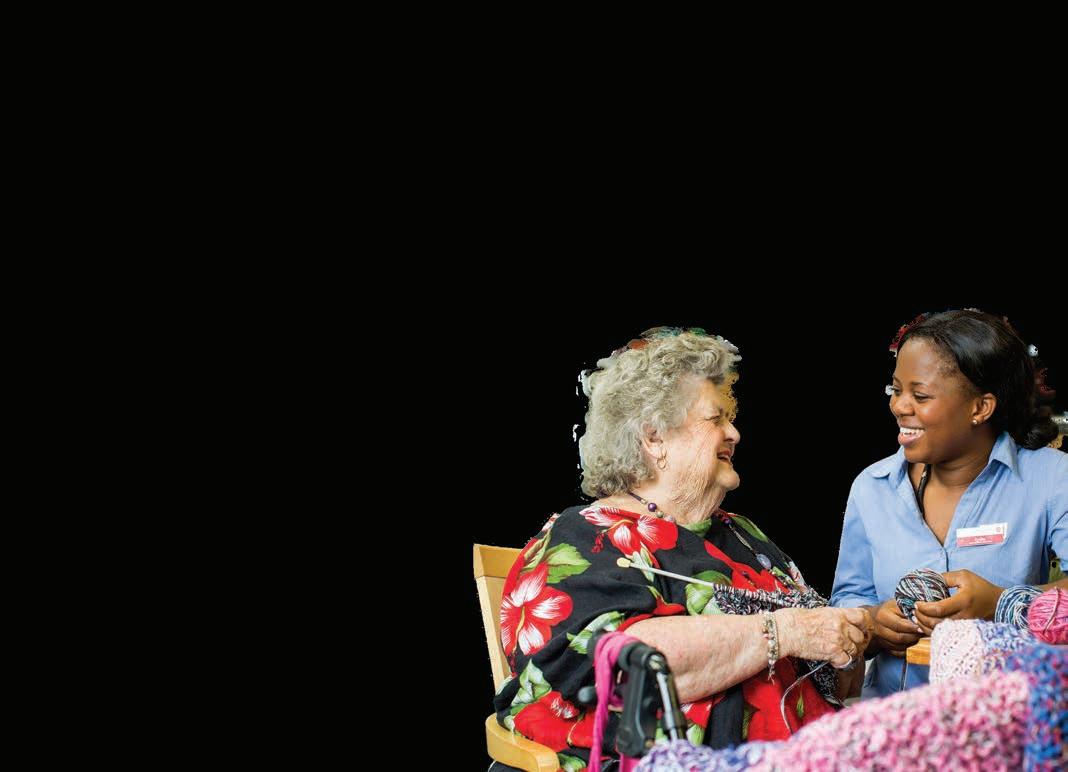
Basic assistance is offered through the CHSP — however, if your needs exceed the level of support offered by this program, then a level 1– 4 Home Care Package can offer higher-intensity support to help you stay at home.
Private providers can also deliver a range of home support services. They are not government funded and you must pay for services out of your own pocket.
There are a few different support options available if you only need support for a short period of time. These options include respite care, which can be delivered in the community or in a residential care home, offering the opportunity for both you and your carer to take a short break.
At the end of a hospital stay, the Transition Care Program provides short-term assistance to help improve your independence and confidence.
If you have not been admitted to hospital, the Short-Term Restorative Care program is a flexible option that focuses on regaining wellbeing over a short period of time.
Moving into residential aged care can ensure quality of life and comfort if you are no longer able to remain living independently at home. Residential aged care facilities, also known as ‘nursing’ or ‘aged care homes,’ provide 24/7 care, along with a range of other support services and recreational activities. The cost of care in most Australian aged care homes is subsidised by the Australian Government.
There are also some non-government-funded residential aged care homes, often referred to as ‘supported and assisted living complexes’ and you will need to cover all the cost of accommodation and care delivered.
Retirement villages are not nursing homes; they are clusters of villas, units or apartments and you will need a reasonable level of independence to move into a retirement setting. The government does not fund retirement options and daily care is generally not included. However, some providers may offer support services at an additional charge or this can be accessed separately through government-funded home support options.
Before you can access government-subsidised aged care supports, such as in-home care, community supports or moving into a nursing home, you need to register with My Aged Care and be assessed to work out exactly what level of support you need.
My Aged Care is the agency that looks after every governmentfunded aged care program. The service can help you find information about subsidised aged care options, including the different types of government-funded services available, eligibility for those services and the associated costs.
You, a family member, carer or client representative can register your details with My Aged Care so that you can be assessed to access any government-subsidised services.
When you first call the My Aged Care Contact Centre on 1800 200 422, an operator will register you and ask you a number of questions about your personal circumstances and care needs.
These questions will be quite basic and shouldn’t take too long. All you will need when you call is your Medicare card, as this information is stored with your other details on the My Aged Care database.
Examples of the questions you will be asked are:
Are you currently receiving aged care services?
Are you getting support from a carer or family member?
Can you prepare your own meals and do housework?
Do you need assistance taking a shower or bath and do you need help getting dressed?
Are there any health concerns or did you have a recent fall?
Do you feel lonely or isolated?
Are there any safety risks in the home?
The aim of this screening is to figure out what needs and support you require and whether you are eligible for a further assessment in person.
My Aged Care will assign you an aged care client number and will open a central client record. This record will include the information you have provided, as well as document your assessed needs and any government-funded care services you have been found eligible for.
If you are successful in your initial application with My Aged Care, the contact centre operator will refer you for an aged care assessment to determine what level of support you would benefit from the most.
If the operator decides that you are eligible for basic home support through the Commonwealth Home Support Programme (CHSP) you will be assessed by a Regional Assessment Service (RAS).

Otherwise, if the operator believes you require higher care support, either through a Home Care Package (HCP) or moving into an aged care home, a member of an Aged Care Assessment Team (ACAT) will visit you to assess you.
To access basic government-funded home support under the Commonwealth Home Support Programme (CHSP), you need to be assessed by the Regional Assessment Service (RAS). For more information about CHSP, go to page 15.
The RAS assessment helps to identify your needs for support and any goals for retaining or regaining skills that enable you to continue living independently in the community. It is conducted free of charge and independently from service provision which ensures assessors consider the full range of options when responding to you and your carers’ needs and goals.
Some of these needs may include assistive technology, therapeutic interventions, community care services or other forms of support.
RAS assessors liaise with other service providers, GPs/specialists and community support networks to make sure desired outcomes are achieved. If your care needs have increased, the RAS can also plan and coordinate an exit from the CHSP and transfer you to other appropriate service systems, including Home Care Packages and/or residential care, if required.
The service also provides care coordination if you have multiple providers or more complex needs.
If you are no longer able to manage at home without basic assistance, the Aged Care Assessment Team (ACAT) helps you and your carers determine what kind of care will best meet your needs.
This may be a Home Care Package (see page 20) provided to you in your own home or residential care in an aged care home (see page 42).
ACAT assessors are generally professionals with medical backgrounds, such as doctors, nurses, social workers, occupational therapists and other health experts.
There is no charge for the assessment as the ACAT is government funded. Carers, relatives or close friends are encouraged to be involved in the discussion of your needs.
While an ACAT can’t make recommendations about individual homes or community services, they can provide you with information to assist you to make decisions.
To assist you in your search, an independent information source like the Aged Care Guide publications and the linked AgedCareGuide.com.au website can help. These resources give a comprehensive overview of all care options and care providers available.
You may be placed on a
list until a
You can find someone to help you:
Placement consultant
Aged care advisor
Social worker
Case manager
Hospital discharge planner
These professionals know the system really well and their help can make your search much easier.
Other useful people:
Financial advisor
Health fund
Veterans' Affairs
Local council
If your situation is urgent then the ACAT will assess you as quickly as possible
Remember: it takes anything from a few weeks up to more than a few months to find the care home that suits you
You can find someone to help you:
Placement consultant
Aged care advisor
Social worker
Case manager
Hospital discharge planner
Consult your Aged Care Guide for a list of choices for any of these options or visit AgedCareGuide.com.au
These professionals know the system really well and their help can make your search much easier.
Other useful people:
Financial advisor
Health fund
Veterans’ Affairs
Local council
To help you live independently in your own home and community for as long as possible, there are many home care products and services available.
Depending on your personal situation and the level of assistance you require, you may be entitled to some basic in-home support or more intensive support through a Home Care Package.
After a hospital stay, the Transition Care Program might be able to assist in your recovery and to return home. Alternatively, you may need to access respite care to give your carer a short break from the caring role.
There is a variety of support at home options available that can meet your specific needs.
The government prioritises your care needs to help you live comfortably in your own home.
Home care products and services range from assistance with daily chores to personal care, providing meals, transport assistance and equipment, such as a ramp, walking frame or shower rail to help you live independently in your home.
A little help to

We deliver the best care management in Tasmania so you can stay independent, safe and happy in your own home for longer. This means flexible and tailored services, responding to changing circumstances, quick and timely visits, expert guidance in navigating a complex system, and carers who live and work in your local community.
NORTH 3 Pattisons Ave Youngtown 7250 03 6351 5151
NORTH WEST 69 Best Street Devonport 7310 03 6454 0020
SOUTH 85 Creek Road Newtown 7008 03 6185 0700
hcs@scctas.org.au
scctas.org.au
• Personal care
• Housekeeping • Nursing services

• Physiotherapy and Clinical consultants
• Companionship
• Social outings
• Transport • Exercise • Gardening • Shopping
• Meal preparation • Hobbies and passions
• Dementia support
• Day Centres in Hobart and Devonport

• Home Care Packages and Commonwealth Home Support Program
• Nursing care
• Personal care
• Assistance with day to day tasks like housework and meal preparation
• Social support such as shopping and attending appointments.
Our local teams are friendly, reliable and clinically trained. We are here to support your independence and wellbeing.
To find out more, give us a call or email us at agedcare@anglicare-tas.org.au
The government continues to significantly increase support for home- and community-based aged care with particular integrated packages available. Private businesses also offer home care services.
Consumer-directed care (CDC) gives you and your carers greater say about the types of care services you receive and the delivery of those services.
All Home Care Packages are delivered on a CDC basis and the funding for a package is allocated directly to you instead of the provider.
Providers are required to work in partnership with you to create a package of services that meets your goals and needs, and gives you the information you require.
This information should assist in choosing the best provider for you, as well as changing providers if you need.
CDC allows you to determine how much involvement you wish to have when managing your package. It also allows for more transparency around how your package is funded and spent.
All home care services you receive should include ongoing monitoring and reviews from the provider to make sure your package is meeting your needs.
If you want to stay in your own home, but need some help with daily tasks or require entry-level care, the CHSP may be able to help.
The CHSP combines a number of home support options into one streamlined and simplified program. These options include short-term supports, such as respite, transition care and short-term restorative care. It also provides basic ongoing support both at home and in the community, as well as access to wellness programs, day options and centre-based services.
To determine if the CHSP is the right program for you, you will need to be assessed by a Regional Assessment Service (RAS). See page 70 for more information.
If you have more complex needs, a Home Care Package may be a better option. You can access similar services to the CHSP, coordinated and tailored to meet your specific needs (see page 20 for more details).
Contact My Aged Care on 1800 200 422 to find out how you can arrange a home support assessment.
Subsidised by the Australian Government, the CHSP is an entry-level home help program if you are mostly — but not completely — able to live on your own and don’t need higher levels of support at home.
The program can also help your carer. If your carer needs to attend to everyday activities, the CHSP can arrange for someone to help you while they are away.
CHSP services provided in the community may include: social support — social activities in a community-based group setting;
transport — help to get out and about for shopping or appointments.
Services provided at home may include:
domestic assistance — household jobs such as cleaning, clothes washing and ironing;
personal care — help with bathing, showering, dressing or toileting; home maintenance — minor general repair and care of your house or yard, for example, changing light bulbs or replacing tap washers; home modification — minor installation of safety aids, such as alarms, ramps and support rails in your home;
nursing care — a qualified nurse comes to your home and may, for example, dress a wound or provide continence advice.
Some CHSP services can be provided either at a community centre or in your home, such as:
food services — may include providing meals at a community centre, help with shopping for food, preparing and storing food in your home and delivering meals to your home;
allied health support services — If you have particular health problems, you may be able to access allied health services such as physiotherapy, podiatry, speech therapy, occupational therapy and advice from a dietitian.
You can apply for home help services under the CHSP if you are 65 years or older, or 50 years or older and identify as an Aboriginal and/or Torres Strait Islander person, are still living at home and need help to continue living independently.
You or your carer should contact the My Aged Care contact centre on 1800 200 422 or visit myagedcare.gov.au to apply.
To determine exactly what help you need at home, you will need a home support assessment. The assessment will be done by a representative of the Regional Assessment Service (RAS).
A local RAS assessor will look at your ability to cope with various activities in your daily living.
If you’re in a situation where you have an urgent need for home support services and your safety would be at risk if those needs are not immediately met, it may be possible to receive CHSP services before you have been assessed by a RAS.
This only happens in exceptional circumstances and is only for a limited time until an assessment can be organised to determine long-term care options.
Services generally considered to relieve an urgent need for care include nursing, personal care, meals and transport.
It will depend on your personal circumstances whether you’ll be able to receive interim services before an assessment. Call the My Aged Care contact centre on 1800 200 422 to find out more.
Supports delivered under CHSP are subsidised by the government, however, there generally is still a fee for each service. You are encouraged to contribute towards the cost of your care if you are able to do so.
The amount you contribute depends on the type and number of services you require and can differ from one service provider to the next. Some organisations may charge a set fee for their services, while others may ask for a voluntary donation, charge a membership or subscription fee.
How much you pay is discussed and agreed upon between you and your service provider. The rate is set before you begin receiving the relevant services.
If you are receiving multiple services from one or more service providers and these services overlap, it may be possible to ‘bundle’ the cost for these services.
To find out specific costs you should contact your service provider.
If you accessed Home and Community Care (HACC), National Respite for Carers Programme (NRCP), day therapy centres (DTC) or Assistance with Care and Housing for the Aged (ACHA) prior to 1 July 2015, you may retain access to these services or equivalent CHSP services until other suitable services become available, or until the service is no longer required.

Get assistance with personal and clinical care, household chores, assistive technology and transport
Remain connected with social groups, outings, respite and carer services
Maintain an independent lifestyle in one of our vibrant retirement living communities
Residential care
Specialist 24/7 care and support, including dementia and palliative care, within a safe and caring community
With services across Tasmania, Uniting AgeWell’s expert, caring team can help you find the right services to meet your needs.
A Home Care Package (HCP) provides services that will help you to remain at home for as long as possible, as well as giving you choice and flexibility in the way that the care and support is provided.
There are four different levels of packages to support people with varying care needs, ranging from Level 1 support, if you have basic care needs, to Level 4, which can support you if you have high-level care needs.
The HCP is allocated to you personally, which gives you more control over the services you receive and who delivers those services.
Once you have been allocated a HCP you can contact any preferred approved service provider to give you the care you need.
There are four types of packages delivering different levels of care:
1 Level 1 supports people with basic care needs
2 Level 2 supports people with low-level care needs
3 Level 3 supports people with intermediate care needs
4 Level 4 supports people with high-level care needs
The same type of care and services are provided under each HCP level, however, the amount of funding is different depending on what package is allocated to you.
The hours of care are increased at each level of care; more hours of care and services are delivered under Home Care Package Level 4 compared to Level 1.
The ACAT assesses the types of care needs you may require. Someone eligible for Levels 3 and 4 HCPs would be eligible for higher levels of residential care if they were to apply for it.
If you are receiving care services through the previous Community Aged Care Package, Extended Aged Care at Home or Extended Aged Care at Home Dementia packages, you will continue to receive these services, but they will have a different name.
Package supplements are available with any of the four levels of Home Care Packages to help with the cost of meeting specific care needs. For example, the Z Dementia Supplement is for people with dementia and the R Veterans’ Supplement for veterans with an accepted mental health condition.
Some packages can be specifically for people who are e financially or socially disadvantaged, people with Y housing needs or at risk of homelessness or for people who live in t rural, remote or isolated areas. Some providers might cater for people with a certain g cultural background or have staff that speak a foreign language.
Your care provider will apply for these subsidies and ensure you meet the eligibility criteria.
Please flip to page 90 to find Home Care Package providers in Tasmania.
Home Care Package services are based on your individual needs. Your provider coordinates the care and services to support you at home and these are agreed between you and your provider. Services may include:
Personal assistance with bathing or showering, personal hygiene and grooming, dressing, toileting and mobility
Assistance with communication, including assistance to address difficulties arising from impaired hearing, sight, speech or lack of shared language. This can also include assistance with the fitting of sensory communication aids, checking hearing aid batteries and assistance in using the telephone
Domestic assistance for household jobs like cleaning, clothes washing and ironing
Food services, such as preparing meals or having meals delivered, assistance with using eating utensils and assistance with actual feeding and providing enteral feeding formula
Nursing services, including dressing wounds by providing bandages, dressings and skin creams, as well as continence management and assistance in using continence aids and appliances
Assistance in taking your medications
Providing mobility equipment, such as crutches, walking frames, wheelchairs and mechanical devices for lifting, bed rails, slide sheets and pressure-relieving mattresses, along with help using those aids
Home maintenance for care of your house or garden
Modifications to the home — installing safety aids, such as alarms, ramps and support rails; identifying risks in the house and proposing solutions
Transport and assistance for appointments or social activities
Encouragement to take part in social and community activities that promote and protect your lifestyle, interests and wellbeing
The following services or items are not included in a package in any of the four levels of home care:
Using the package money as a source of income for the consumer
Purchase of food, except for enteral feeding requirements
Paying for accommodation, such as assistance with home purchase, mortgage payments or rent
Payment of fees or charges for other types of care funded or jointly funded by the Australian Government
Home modifications or capital items that are not related to the consumer’s care needs
Travel and accommodation for holidays
Cost of entertainment activities, such as club memberships and tickets to sporting events
Payment for services and items covered by the Medicare Benefits Schedule or the Pharmaceutical Benefits Scheme
Gambling activities
Just Better Care is an approved provider of Aged Care services and has been supporting thousands of older Australians since 2005. We deliver the highest quality care to enable individuals to live independently and confidently within their own homes and their local communities.


To receive a Home Care Package, you will need to be assessed by an Aged Care Assessment Team (ACAT).
The ACAT helps you and your carer determine what kind of care will best meet your needs when you are no longer able to manage on your own.
A member of the service, which may include a doctor, nurse, social worker and/or other health professional will meet with you to assess your care needs and how well you are managing at home.
They will identify the right services for your needs and the level of care you require.
The ACAT will give you a letter stating the types of subsidised services you have been approved for and might also put you in contact with organisations in your area that can deliver these services.
For more details about assessments, go to page 70 or call 1800 200 422 to organise an assessment.
Access to Home Care Packages is managed through a national pool of all available packages. After approval for a HCP, you will be placed in a ‘queue’ until a suitable package becomes available. This may take a number of weeks or even months.
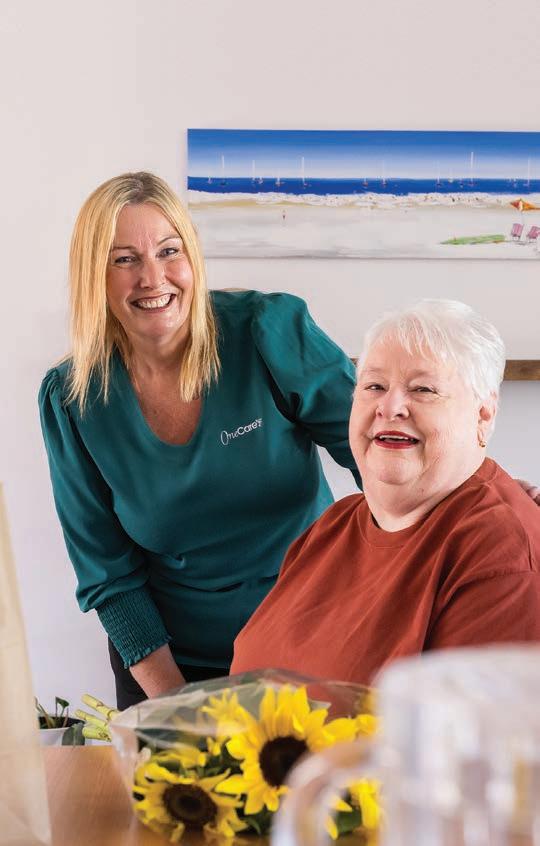


Your place in the queue will be determined by your personal needs, circumstances and the time you have been waiting for care since your assessment.
When you reach the front of the queue and a package is assigned to you, you can begin to receive care from the provider of your choice.
You have 56 days from the date you were assigned a package to find a provider and commence services.
You can request an extension, for example, if you have trouble finding a service provider. However, if you haven’t started receiving care within 84 days, the package will return to the queue and be assigned to the next person in line.
An organisation that has been approved by the government to provide aged care services is called an ‘approved provider.’
The government will pay your approved provider your allocated funding so they can pay the carers and any other bills.
An approved provider can manage your care, liaise with you about your preferences, requirements and care plan, but it doesn’t have to be the provider delivering your care.
It is important to know that even though a HCP can only be managed by an approved provider, the care can be delivered by any provider, even one that is not supported by the government. This gives you more choice as to who delivers your care.
This agreement is made between you and your provider and covers information such as the care and services you will receive and how much they will cost.
Your provider will work with you to develop a care or service plan that is based on your needs.
The care plan you agree to should include:
The exact types of services you will receive
Who will provide which services
How much involvement the service provider will have in managing and coordinating your services
When your services are delivered
Any exit amount the provider will charge to cover administrative cost if you decide to take your package elsewhere or cease care
The government covers most of the cost of care but your provider may ask you to contribute towards the cost of delivering your services, if you can afford to do so.
Depending on the Home Care Package level you are eligible for, the government pays your approved provider a subsidy toward the cost of your care. This amount is calculated daily and paid monthly to the provider.
TOP LEVEL SERVICE ICONS SINGLE - WITH WORDS

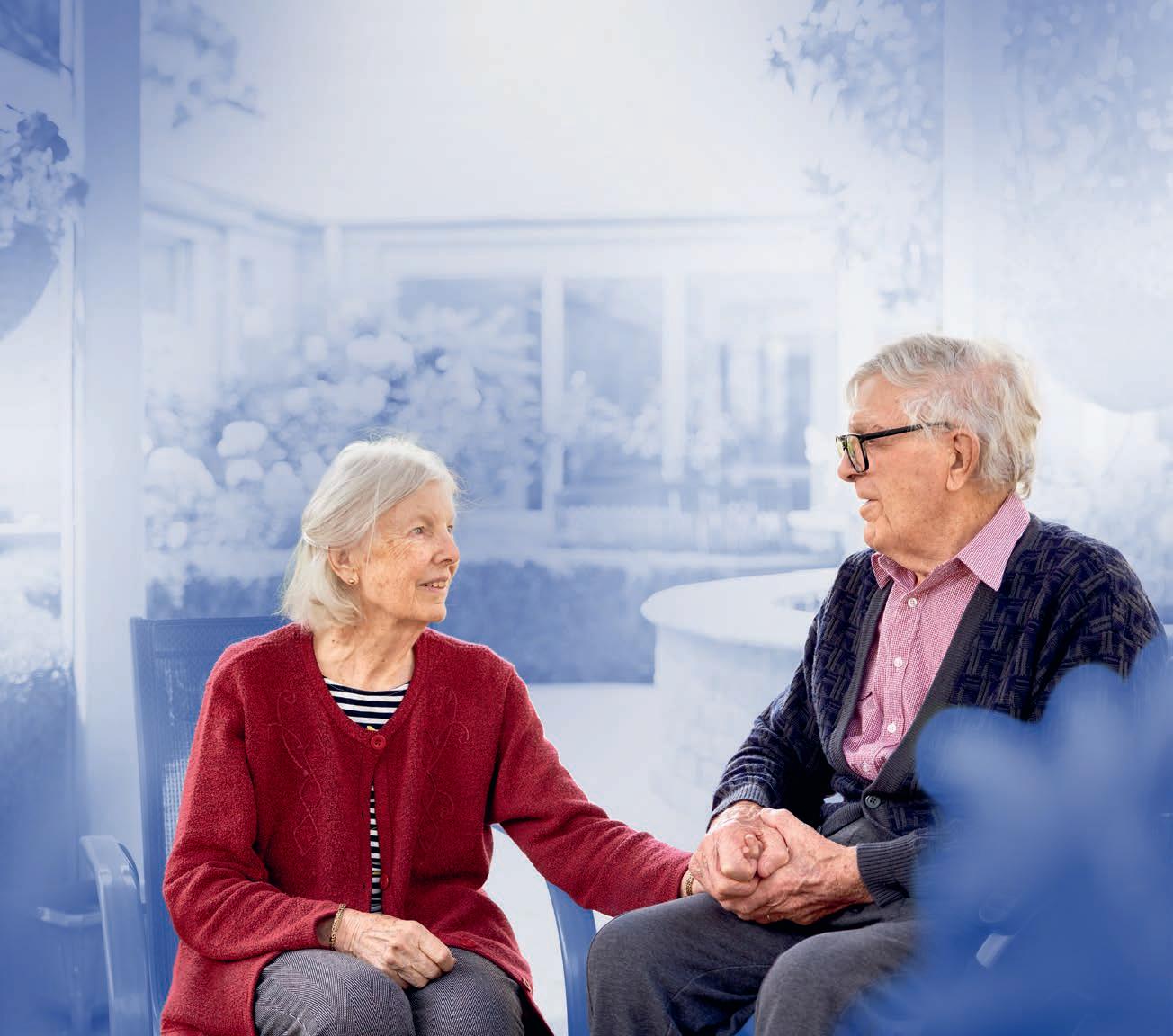
Guided by Calvary’s 135 year history in health care, you will have peace of mind with access to quality care.
Calvary is recognised as a continuing source of healing, hope and nurturing to the people we serve. Our personalised approach ensures every person receives the attention and care that they need. All of our care is delivered with dignity and is designed to improve your health and wellbeing.
amount
The government contributes the following amounts to each person receiving a Home Care Package (March 2024 rates): Home Care Package Daily subsidy amount
1
2
3
4
This amount may be supplemented with an additional payment for people with higher care and specialised support needs, such as a Dementia, Veterans’ or Housing supplement.
Rates are reviewed generally in March and September each year in line with changes to the Age Pension. This applies to each person receiving a Home Care Package, even if you are part of a couple.
Any government funding you receive will be paid directly to the provider who can spend the funds on the items you both agreed to in the home care agreement.
After commencement of your package, you will receive a monthly statement of income, expenditure and the balance of funds enabling you to see how the money is being spent.
A provider may charge the maximum basic daily fee for a Home Care Package depending on what level you have been given. Maximum fees for each level currently are (March 2024 rates):
There may be additional benefits available depending on your personal circumstances, contact My Aged Care on 1800 200 422 for more details.
If your income is higher than the Age Pension you may be required to pay extra for your care.
How much extra depends on your income and unavoidable expenses, such as pharmaceutical bills, rent, utilities and other living expenses. However, the maximum amount you can be asked to pay over the maximum basic daily fee for a HCP is up to 50 percent of your income exceeding the maximum base rate of the Age Pension.
The current Age Pension amount is $1,020.60 per fortnight for a single person or $1,116.30 with the included maximum Pension Supplement and Energy Supplement.
You can negotiate with your provider on the costs of the services and care you receive.
These costs will be agreed upon and fixed in your agreement before you receive any aged care services. This is your legal agreement with your service provider.
No full pensioner will pay an income tested care fee and no part pensioner will pay an income tested care fee greater than $6,661.80 per annum.
If you have an income of more than $63,351.60 per year, you will pay an income tested care fee on a sliding scale up to a total of $13,323.68 per annum.
However, no one will pay more than $79,942.44 in an income tested care fee over their lifetime (March 2024 rates).
You will only pay an income tested care fee if you can afford to do so. Your income assessment will determine if you can afford to contribute towards the cost of your care.
Your assets, including the family home, are excluded from the means testing arrangements for home care.
HCPs are portable which means that if you are moving to a different area or if you’re not happy with a provider’s services, you can simply take your package and any remaining funds with you to a new provider.
If you decide to change providers, the provider may charge you an exit fee to cover any administrative cost which will be deducted from any unspent funds.
This is the amount that is ‘left over’ in your HCP budget and it will move with you to a new provider.
If you no longer require your HCP, these unspent funds will be returned to the government.
Exit fees may vary between providers and the amount should be clearly stated in the home care agreement between you and the provider.

Co��ittuJ to Ca.rt �i#l.U IB'lt,
The District Nurses has been caring for Tasmanians at home since 1896.
has Tasmanians
The District Nurses has been caring for Tasmanians at home since 1896.
Our nursing teams can your home.
Our nursing, care management and support teams can provide a full range of services in your home.
Our nursing, care management and support teams can provide a full range of services in your home.
We are a leading provider of Home Care Packages, Commonweath Home Support, HACC, End of Life care and private services in Tasmania.
We are a leading provider of Home Care Packages, Commonweath Home Support, HACC, End of L ife care and private services in Tasmania.
We support you to stay healthy and independent at home and within your community.
W e are a leading P ac k ages , HA CC , E nd in T asmania.
We support independent community.
We support you to stay healthy and independent at home and within your community.
ci 03 6208 0500
ci 03 6208 0500 IJ @thedistrictnurses thedistrictnurses.org.au SINCE 1896
IJ @thedistric thedistrictnurses.org.au
The Australian Aged Care Quality and Safety Commission is responsible for the review of aged care services, including government-subsidised home care services.
As an independent body, the Commission manages the accreditation of residential aged care services and the quality review of home care services across Australia.
It evaluates these services against the set Aged Care Quality Standards. The Commission is committed to promoting continuous improvement of aged care and ensures that quality and other reporting by service providers is streamlined while supporting accountability, information and confidence for consumers.
If you are concerned about the care or services you are receiving, it is recommended that you first try to resolve any issues with your service provider.
If you feel you are not being heard or need help to address the issue, you can contact an aged care advocacy service to help you.
If the matter is not resolved, you can make a complaint to the Aged Care Quality and Safety Commission on 1800 951 822 or visit agedcarequality.gov.au
No matter who you are, where you live or the types of care you need, you have rights related to your home care that should be respected by providers.
You have a right to:
Be accepted as an individual and have your preferences respected
Be treated with dignity, with your privacy respected
Receive care that is respectful of you, your family and home
Receive care without being obliged to feel grateful to those providing the care
Full and effective use of all human, legal and consumer rights, including the right to freedom of speech regarding your care
Have access to advocates and other avenues of redress
Be treated without exploitation, abuse, discrimination, harassment or neglect
Under the consumer-directed care principles, you also have the right to:
Set your own goals for your supports
Determine the ongoing level of involvement and control you have over your home care
Make decisions in relation to your care
Maintain your independence as much as possible
Choose the care and services that best meet your goals and assessed needs, within the limits of the resources available
Have choice and flexibility in the way the care and services are provided in your home
Participate in making decisions that affect you
Have your representative, family member or close friend participate in decisions relating to your care if you request it or need support to make decisions
These rights mean you can live the life you want to live for as long as possible.
If you think your rights are not being respected you should talk to your provider about your concerns. If this does not solve the issue you can contact the Aged Care Quality and Safety Commission.

your choice, our focus
Our range of services will support you in the home and in the community so you can maintain your independence and social connections.
Stay in the place you’re familiar with and keep connected with friends and family with support from CBS. The right amount of support from the right people can go a long way.
In July, the government will introduce the Integrated Assessment Tool as part of the transition to a Single Assessment System Workforce in late 2024. The Single Assessment System will replace the:
• Regional Assessment Service;
• Aged Care Assessment Teams;
• independent Australian National Aged Care Classification (AN-ACC) assessors.
According to the Department of Health and Aged Care, First Nations assessment organisations will be introduced progressively from July 2025.
Following delays announced in 2023, the new Support at Home program will be introduced in July 2025 to replace Home Care Packages and the Short-Term Restorative Care Programme. The Commonwealth Home Support Programme will also transition to the new program from 1 July 2027.
A new Aged Care Act will be introduced to parliament in 2025 to reform existing aged care laws, as per the:
• Aged Care Act 1997;
• Aged Care (Transitional Provisions) Act 1997;
• Aged Care Quality and Safety Commission Act 2018.
To stay up-to-date with reforms, please contact the Ageing and Aged Care Engagement Hub by email: agedcareenquiries@health.gov.au.

•

• With 40 years’ experience we are experts in providing community care in Tasmania!
• We are one of the best value providers of Home Care in Tasmania!
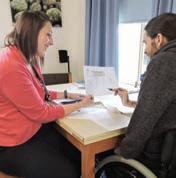
• We offer Allied Health Services from our in house staff at reduced rates!
•
•
Rather than a government-funded service, you may choose a private home care provider and pay for services out of your own pocket.
Maybe this is more cost-effective for you or there is a waiting list for the government service you are trying to access.
Private home care services are arranged directly between you and the service provider. You pay for all the services provided and there is no government subsidy.
Private home care organisations provide a wide variety of services, including registered nurses for complex care needs and carers for companionship, personal care, housekeeping, cooking and outings.
They may also provide other types of staff, such as advisors, assistants, dietitians, drivers, personal trainers, physiotherapists and occupational therapists.
There is no limit to the number of hours of care provided each week and you can generally increase or decrease the time as your requirements change. With an agreed notice period, you are not required to pay for shifts you do not require.
While private home care may seem expensive, you may find that it is more cost-effective than other institutional alternatives. There is a wide variety in the level of quality and cost of home care companies.
When looking into home care services, here are some things to investigate and ask the provider you are considering:
Do they service your area?
Is the company Australian-owned?
Is it independent or part of a franchise?
Do the owners/operators have experience in home care?
Does the company have appropriate insurance?
Does the company comply with Australian Tax Law — for example, does it charge GST appropriately?
Do they provide documents about financial arrangements before service begins?
Do they have a Service Agreement? It is important, so that there’s no misunderstanding about the service and cost to be provided.
Are they flexible? After all, it is all about you.
What are their recruitment processes?
Is there a criminal background check performed prior to employment with an agency?
Does the company provide worker’s compensation for employees? This is important so that you are not responsible for any injuries that occur on the job.
How do they determine appropriate staff for your needs? If a company asks where you live and then offers you staff before even hearing about your needs, you can be reasonably assured they allocate based on location as a priority.
Is it possible to interview potential carers and make a selection after those interviews?
Do you get to decide what times and days suit your needs?
What is the minimum shift length?
Do they have male/female workers and can they cater for specific cultural backgrounds?
Who will be working in the home? Will there be regular staff providing continuity of care or do they change shifts around?
Is there a professional staff member, such as a registered nurse, who liaises with you to create a plan that meets your needs?
Who is the organisation’s main contact for you?
Do you meet a manager/owner and then never hear from them again?
What additional support is offered within the cost of your care? For example, are they available 24-hours a day, seven days a week?
You’ll find a list of in-home care service providers from page 84 in this Guide or visit AgedCareGuide.com.au to find providers servicing your location.
If you are a veteran, war widow or widower, you may be eligible to receive extra help in your home from the Department of Veterans’ Affairs.
If you are having a hard time doing the regular household chores, struggling to get in and out of the bathroom safely or if you just can’t manage the gardening or household maintenance, then the Veterans’ Home Care (VHC) program could organise people to help you.
The VHC program offers a range of services including domestic assistance, personal care, safety related home and garden maintenance or respite care in your own home or residential care facility.
If you have specific medical care needs or need more intensive assistance, a nurse from the Community Nursing Program may be able to help you stay in your own home for longer. Services may include medication management, wound care or hygiene assistance.
To receive these services, you need to be referred for an assessment by an appropriate health professional. This could be your GP, a treating doctor in hospital, a hospital discharge planner or a VHC assessment agency.
Call the Veterans’ Home Care Assessment Agency on 1300 550 450 to find out what support services are available to you and how you can access them.

Taking some time off from caring is crucial and known as ‘respite.’ Respite can be provided in your own home, a community setting or an aged care home.
Respite care offers the opportunity for both you and your carer to take a break. This may be for a few hours, a day, a night or a few weeks.
Respite care is provided by residential aged care homes and by community care services under the Carer Gateway.
Accommodation and services include: day care centres that provide respite for a half or full day; in-home respite services, including overnight, home and personal care services; activity programs; a break away from home with a support worker; respite for carers of people with dementia and challenging behaviours; respite in an aged care home or overnight in a community setting; and respite for employed carers and for carers seeking to return to work.
Access to respite care is based on priority and need. For respite care in your home or in a day care centre, the respite service provider or the Carer Gateway will assess whether you and your carer are eligible.
The amount of care you receive will depend on your needs and the availability of respite care services.
Centre-based Respite Care (CBRC) can provide respite services to carers, offering individualised social and recreational activities.
Through CBRC, you can also attend day programs which may include excursions, outdoor/indoor activities or holiday programs.
Trained respite workers often undertake client assessments. Need-based programs are then developed with you and your carer to help enhance your quality of life.
There is no charge for assistance provided by Carer Gateway, however, individual service fees may apply.
Community-based respite services charge fees according to the type of service being used and your ability to pay.
For more information contact the Carer Gateway on 1800 422 737. Your call will automatically be directed to your nearest state or territory provider.
To help improve your independence and confidence at the end of a hospital stay, the Transition Care Program provides short-term support and assistance.
The Transition Care Program is goal-oriented, time-limited and therapyfocused care that can be delivered in your own home or in a home-like ‘live-in’ setting, which may be an aged care home.
To be eligible for transition care, you must be an in-patient of a hospital and have been assessed by the Aged Care Assessment Team (ACAT).
Transition care can be provided for a period of up to 12 weeks, with a possibility to extend to 18 weeks if assessed as requiring an extra period of therapeutic care. A person is expected to receive support for seven weeks, on average.
Services
Transition care is delivered by approved providers who will offer a package of services including a range of low-intensity therapy services and nursing support and/or personal care services.
Low-intensity therapy services may include:
counselling and social work
dietetics
occupational therapy
Personal care services may include: help with showering and dressing assistance with eating and eating aids
managing incontinence
Fees
physiotherapy
podiatry
speech therapy
transport to appointments help with mobility and communication
You may be charged a contribution fee to cover the cost of your transition care. Talk to your provider about what fees apply and how much you need to pay.
For transition care received in your own home, the maximum amount is currently $12.75 per day (March 2024 rates).
For care delivered in a ‘live-in’ setting, such as a residential aged care facility, the maximum amount you can be asked to pay is $61.96 per day (March 2024 rates).

Access to transition care is decided on a needs basis and not on your ability to pay fees. Talk to your hospital social worker or discharge planner to find out more about how to access the Transition Care Program. Aged care homes offering transition care beds are listed in the residential aged care tables from page 94.
To help regain your independence if you have not been admitted to hospital, the government has introduced a flexible care option.
You may benefit from the Short-Term Restorative Care (STRC) program if you have been sick or had a fall and your mobility is temporarily impaired. The program focuses on regaining wellbeing over a short period of time, with a maximum of eight weeks.
The Federal Government created the program to reverse or slow functional decline in older people and help improve their health and wellbeing through the time-limited service.
The ultimate aim is to avoid you having to access ongoing in home care services or residential care.
The program is designed around improving your capabilities at performing everyday tasks you may be having difficulties with.
A team of professionals would provide the service to help you adjust to the differences in your abilities.
This could involve activities and exercises that will benefit your mobility or could result in home modifications to make everyday tasks more manageable.
You will be able to choose the services you want to be provided so the assistance you receive will be tailored to your specific needs.
Services can be delivered at your home, in a nursing home or a combination of both.
You may need to pay a small fee, although you won’t have to pay an accommodation payment if you receive STRC in a nursing home setting.
The daily fee is currently $12.75 for STRC received in a community setting or $61.96 if accessed in residential care or a hospital.
The STRC program is not linked to any other government-funded home support and you will be able to access the program even if you’re already receiving support through the CHSP.
You will not be eligible to receive the STRC program if you are currently: receiving a government-funded Home Care Package; have received transition care in the last six months; live in residential aged care.
You do need an assessment to access the program.
This assessment is done by the Aged Care Assessment Team (ACAT) and is only valid for six months. You can access the STRC program twice over a 12-month period.
Read more about assessments on page 70 or call My Aged Care on 1800 200 422 for more information about STRC.
Wellness centres offer a range of programs and services that focus on mobility, exercise, rehabilitation and relaxation. A well-equipped wellbeing centre also provides the opportunity to address areas of concern, enhance your mobility and reduce your pain levels and risk of falls or injury.
You can access a wide range of physically and emotionally rewarding activities with the guidance of allied health specialists in these centres, also known as ‘day therapy centres,’ ‘health & lifestyle centres’ or ‘allied health hubs.’
Most centres offer a range of stimulating and fun activities, one-on-one or in group settings to help improve your memory, wellbeing and independence.
Some allied health and wellbeing services you may be able to access include:
Occupational therapy
Diversional therapy
Massage therapy to reduce pain and maintain overall wellbeing
Physiotherapists or exercise physiologists
Podiatry
Hydrotherapy
Dementia and cognitive support programs
Personal training
Exercise classes for all levels, including chair-based and dance classes
Nutrition information
Mat- and equipment-based Pilates classes
Specialised group classes for specific conditions, such as Parkinson’s disease, multiple sclerosis, diabetes, cardiac and pulmonary rehabilitation
These wellness or day therapy centres are sometimes combined with different centre-based care services focused more on social inclusion and community connection.
The programs and services offered through this centre-based care are all about encouraging positive ageing and wellbeing and work to provide you with emotional, mental and physical stimulation.
Some programs may be tailored to specific groups such as people from a multicultural background or those living with certain chronic conditions such as dementia.
You can enjoy a range of activities which may include daily exercise programs, arts, crafts, cooking, gardening, as well as education and learning services, group excursions and respite or overnight care.
There are many benefits of centre-based care including:
Improved social wellbeing through companionship and connection
Maintaining mental health, nutrition and exercise
Positive impacts on overall health and wellbeing, including reducing symptoms of pain
Support for carers and families
If you are over the age of 65 years, the services offered at a wellness centre may be the key to better physical health to help you stay strong and independent. A range of allied health specialists may be able to support your mental agility and keep you performing day-to-day tasks properly
You may be able to claim the associated costs of a wellness centre through the Regional Assessment Services (RAS) or Aged Care Assessment Programs (ACAP). To receive an assessment, call My Aged Care at 1800 200 422, then ask for a referral code. Based on the outcome of your assessment and the package which you are eligible for through the Commonwealth Home Support Programme (CHSP) or Home Care Package (HCP), health and wellness services may be subsidised by the government.
You can still access the services at a wellbeing or day therapy centre privately and pay for services as you go. To do so, you would need an initial consult to identify which services you need and the amount you will pay to access them.
Getting to appointments, the shops or social events can be challenging if you don’t have a car and even more challenging if you have mobility issues.
There may be times when friends, family and neighbours are unable to help out. While transport can be part of government-funded supports, there is also a range of free or subsidised transport options available through a variety of outlets.
In Tasmania, there are many volunteer groups, such as local churches, clubs or Rotary groups, that support frail elderly people over 65 years of age in many ways, including through transport services.
These community volunteer transport services provide either direct transport or assist older people in accessing public transport.
They can take you to appointments, out and about in your community, visit friends and family or go to the shops.
Most of these community schemes or groups are staffed by volunteer drivers. Depending on the organisation, the services may be free or you may have to pay a small contribution towards the organisation.
St John’s Ambulance Australia provides a community transport service and patient transport service in most states or territories.
These services can support older people who need to attend medical appointments or hospital, visit loved ones, attend events, family gatherings or to go grocery shopping.
Tasmanian local councils frequently offer transport in two forms — community buses and personal transport.
Some councils operate community buses on a weekly basis with many offering the convenience of door-to-door pick-up and drop-off. There is usually a nominal minimal charge for using the community bus that may vary depending on where it is going and whether you require a return journey.
Additionally, some councils offer personal transport for medical, wellbeing and other essential appointments and are usually provided by council volunteers.
Contact your local council for information about transport in your area.
Community Transport Services Tasmania (CTST) provides transport assistance to those in need living in Tasmania.
Visit ctst.org.au or call 1800 781 033 for more information.
A Seniors Card or Pensioners Concession Card could also give you a discount on travel, including reduced taxi fares. To find out more, visit concessions.tas.gov.au.
The changes that occur with ageing can lead to problems with mobility, such as unsteadiness while walking, difficulty getting in and out of a chair or falls.
These are reportedly the top mobility problems experienced by older people and a major cause of injury and death.
Muscle weakness, joint problems, pain, disease and neurological difficulties can also contribute to mobility problems.
Keeping mobile can give you the opportunity to maintain independence in order to fulfil daily tasks and live happily in your own home.
Although light physical activity can help improve your mobility and remain independent, some people also find comfort and assistance in mobility equipment or aids that help them live more satisfying and productive lives.
Creating a safe living space is critical to keep your independence and prevent injuries. Whether it’s slippery floors or tripping over electrical cords, some of the most common causes of injury in people over 65 are in and around the home.
You can improve the safety of your home by making some basic changes: Remove clutter around the home to reduce the risk of tripping over. Keep hallways and staircases clear from clutter and make sure you check outside areas for clutter and tripping hazards as well.
Install grab-bars and handrails to help you get down the stairs safely or step in and out of the shower or bathtub without injuring yourself.
Repair or remove tripping hazards such as loose carpet, slippery throw rugs or floorboards that stick up. Replace those items and use non-slip mats for more effective fall prevention.
Inadequate lighting can also contribute to falls or injury, so install brighter light bulbs where needed and make sure stairways and narrow hallways are properly lit. Make sure you have easy access to bedside lamps and consider using motion-sensor lights to create better guidance for moving around your house at night.
Even with grab-rails, stairs can present a significant falling hazard. Non-slip strips can help make stairs safer to go up and down or consider having a stair lift installed for easier access to the second level.
Personal alarms that can detect falls, call for help in an emergency or have a GPS tracker can be used to help you feel safe and secure in your own home or when you’re out in the community.
There are several different types of mobility aids available that can help you maintain independence and safety, assist in walking and moving about, help you with personal care and make it easier for you to remain socially active.
Readily available technology can enhance your quality of life through products such as...
Mobility aids — Aids that can help to prevent falls include walking sticks or frames, wheelie walkers, manual and motorised wheelchairs and scooters.
Personal care — Some of these aids may include shower stools or chairs, shower hoses, bath seats and boards, over-toilet frames, commodes, urinals, continence pads and supplies; aids to assist with dressing and aids to manage medications.
Home safety — Some of the aids that can assist you around the house during day-to-day living may include handrails, ramps, tap turners, non-slip mats, easy-grip utensils and easy-pour kettles.
To remain independent and in good health, it’s important that you can look after yourself, move, eat and drink well, stay connected and have fun.
Fortunately, there’s a range of assistive technology solutions that can support you to:
Prepare your own meals and eat or drink independently
Communicate and stay connected
Move around your home and community
Manage your own personal care such as bathing or dressing
Use your computer, tablet or phone
Participate in sports and other recreational activities
Control your appliances, such as your TV and lights
Undertake daily tasks safely
Be more independent in your own home and when out and about With over 25,000 assistive technology products on the market, it can be difficult to know what the best solutions for your needs are.
Independent Living Centres (ILCs) are information resource centres, located in every state and territory, that display a range of products and equipment to assist with daily living activities.
You can visit an ILC to test products and equipment and select those most suitable before purchase.
In Tasmania, the Independent Living Centre supports people with their assistive technology choices through information and advice, allied health support as well as access to grants for individuals to get access to a range of technology items including:
Emergency call systems
Wheelchairs and scooters
Telephones
Showering, toileting and dressing aids
Kitchen equipment
Seating, beds, and mattresses
Hoists and transfer aids
Vehicle modifications
Smart home technology
Through an online National Equipment Database (NED), you can search for assistive technology products Australia-wide, including supplier details and product specifications. Find out more at askned.com.au . For further information, call 03 6335 9200.
If you aren’t able to continue living independently at home, you may choose to move into an aged care home.
The Australian Government regulates and funds the provision of much of the aged care in Australia.
‘Aged care home’ is the term most commonly used, but you may also find this type of accommodation referred to as ‘nursing home,’ ‘aged care facility,’ ‘residential aged care’ or ‘high- and low-care facility.’ All of these terms can be used interchangeably to describe the same type of living arrangement.
Entry into a government-funded aged care home requires approval by an Aged Care Assessment Team (ACAT).
There are also non-government-funded aged care homes which are called ‘supported-’ or ‘assisted-living complexes.’ These do not require ACAT or government approval.
If you or someone close to you feel you are in need of some form of residential care, you can speak with your doctor who can make initial contact with My Aged Care.
You can also contact My Aged Care direct or a representative, like a family member or friend, can do this on your behalf. Call 1800 200 422 to organise an ACAT assessment. See page 70 for information about ACATs.
After being approved by an ACAT for government-funded residential care, you may begin looking for your future home. You can do this yourself or you can hire a placement consultant who can make the job much easier for you.
It is important to know and understand the types of homes available in your area as this may affect the cost and services you receive.
It is also recommended that you visit as many homes as possible, just as you would when buying or renting a house. This will enable you to gauge the feel and culture of the home.
Aged care homes provide accommodation ranging from single rooms with ensuites to rooms with shared bathroom facilities. They must provide specified care and services to all residents at no additional cost.
Services that must be provided at no additional charge for all residents who need them, irrespective of their level of care needs, include:
Basic accommodation related services such as beds, mattresses, linen, bedside lockers and chairs
General laundry and cleaning services
Maintenance of buildings and grounds
Utilities, such as electricity and water
The provision of staff continuously on call to provide emergency assistance
Assistance with personal care such as bathing, going to the toilet, eating and dressing
Assistance with mobility and communication
Assistance in obtaining specialised therapy services, or a health practitioner service
Meals, including special diets
Toiletry goods such as towels, washers, soap and toilet paper
Support for people with cognitive impairment like dementia
Social and recreational activities
Rehabilitation support
Additional services as appropriate to individual care needs where a fee may apply include:
Goods to assist with toileting and continence aids
Therapy services such as speech therapy, podiatry, occupational, recreational and physiotherapy
Registered nurses to assess, plan and manage care, including complex pain or wound management, palliative care program, special feeding, dialysis and oxygen therapy
For people with dementia, it is important to ask a home whether it offers separate or secure dementia-specific units or wings.


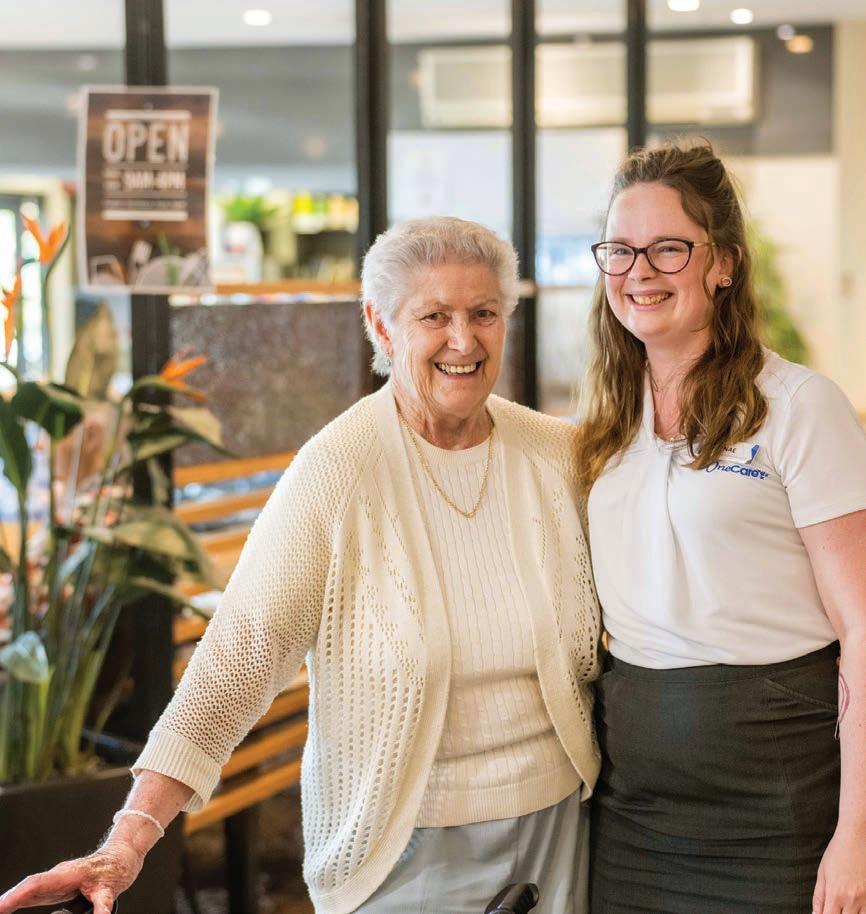

Some nursing homes may have a secure garden area specifically designed for people with dementia, which is generally attached to the secure dementia unit.
There are homes that cater to a specific cultural and linguistic group or may offer culturally appropriate services. See 98 – 99 for a list of culturally appropriate care homes and services g.
Pets can help lessen feelings of loneliness or isolation and some homes are happy to accommodate you and your pet.
Some nursing homes even have live-in pets. You’ll find these C listed in the directory section of this guide, starting on page 94.
All government-funded care homes must meet required accreditation standards and demonstrate continuous improvement with regard to the quality of care and services provided to residents.
The standards that must be met cover areas such as management, staffing, health and personal care, resident lifestyle, living environment, catering, cleaning, continuous improvement, safety and security.
The Aged Care Quality and Safety Commission is responsible for the review of aged care homes.
It monitors residential aged care services to ensure their compliance with the accreditation standards.
You can ask the provider for the accreditation status of the home or access reports and find information about the process on the Commission’s website — agedcarequality.gov.au
The Aged Care Quality Standards were introduced in 2019 as a new measure of quality in aged care.
The eight new standards have a much stronger focus on consumers to help them make informed decisions about aged care services.
It gives consumers confidence that aged care providers will work in partnership with them and their families to deliver care that supports their health, wellbeing and quality of life.
The new Quality Standards include the following focus areas:
Consumer dignity and choice
Ongoing assessment and planning with consumers
Personal care and clinical care
Services and supports for daily living
Organisation’s service environment
Feedback and complaints
Human resources
Organisational governance
Each of the standards looks at three key aspects: What is the outcome for the consumer?
What are the expectations of the organisation?
What are the organisational requirements to show that the standard has been met?
The new standards revolve around consumers, their families and the staff providing care.
This partnership between the provider and consumer needs to work in order for the eight areas to succeed.
All government-funded aged care homes and home care services are measured against the new standards and organisations must be able to provide evidence of their compliance and performance with the Quality Standards.
Supporting the Aged Care Quality Standards is a single Charter of Aged Care Rights, protecting the rights of consumers receiving aged care services and their right to be properly looked after, treated well and given high-quality care and services.
All aged care providers have to provide a personally signed copy of the Charter of Rights to every one of their residents or care recipients.
The Charter covers 14 fundamental protections stating all older Australians receiving any type of government-funded aged care supports have the right to:
1. Safe and high-quality care and services;
2. Be treated with dignity and respect;
3. Have your identity, culture and diversity valued and supported;
4. Live without abuse and neglect;
5. Be informed about your care and services in a way you understand;
6. Access all information about yourself, including information about your rights, care and services;
7. Have control over and make choice about your care and personal and social life, including where the choices involve personal risk;
8. Have control over and make decisions about the personal aspects of your daily life, financial affairs and possessions;
9. Your independence;
10. Be listened to and understood;
11. Have a person of your choice, including an aged care advocate, support you or speak on your behalf;
12. Complain free from reprisal and to have your complaints dealt with fairly and promptly;
13. Personal privacy and to have your personal information protected;
14. Exercise your rights without it adversely affecting the way you are treated.
You should receive a copy of the Charter signed by your provider and you or your representative will be asked to sign the Charter to acknowledge that your provider has given you information about your rights in relation to the aged care service under the Charter.
Our range of flexible health and lifestyle services supports every step of the ageing journey.

Get the maximum out of life, with the minimum of worries. Our lifestyle village communities across Tasmania are perfectly designed for independent living. For those who enjoy peace of mind, freedom and comfort, and the choice to access support and care services if needed. Contact us for
A safe and nurturing environment providing Residential Care from a professional care team, including 24/7 on-site nurses, dedicated chefs, qualified carers and lifestyle co-ordinators. Some facilities have a dedicated Memory Support Unit for people living with dementia.
Stay happy, healthy and living independently in your own home, in your own community. Clinical, domestic and personal care, companionship, transport, and much more. Our complete range of services enables you to live in the comfort of your home for as long as possible.
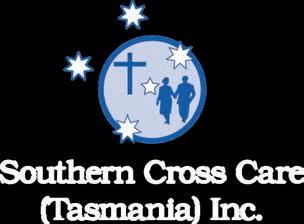
As a consumer, you have the option of signing the Charter of Aged Care Rights. However, even if you choose not to sign the document you can still access care and services.
Call the Aged Care Quality and Safety Commission on 1800 951 822 or visit agedcarequality.gov.au for more information.
If you have concerns or are unhappy about the standard of care you are receiving, you or your representatives are strongly encouraged to firstly take all complaints to the facility management for resolution.
It’s always best to address concerns rather than leaving it to escalate. If you don’t feel comfortable to deal with it yourself, you can ask an advocacy service to help you.
If the matter is not resolved, you can then make complaints to the Aged Care Quality and Safety Commission on 1800 951 822 or visit agedcarequality.gov.au .
Anyone can make a complaint about anything that may constitute a breach of the service provider’s responsibilities to past or present residents.
As soon as you have been approved by an Aged Care Assessment Team (ACAT) for government-funded residential care, you can begin looking for your future home.
You can do this yourself or you can hire a placement consultant to do this for you.
When searching for nursing homes, decide what features are important to you. Are you looking for an extra service facility, a specific cultural environment or a facility with pets?
It is important to know and understand the types of homes that are available in your area because this may affect the cost and services you receive.
It is recommended that you visit as many homes as possible, just as you would when buying or renting a house. This will allow you to get a feel for the culture of the home and its surroundings.
You can also use residential respite as a way of finding out about the quality of care at a nursing home before deciding if the home is a good place for you to move into.
When you have narrowed down which homes would suit your needs and wants, it is best to apply to a number of homes to increase your chances of finding a place quickly.
Nursing homes don’t always have bed vacancies available, so it is likely that you will have to wait for a period of time for a bed to become available.
Some aged care homes may have waiting lists and the length of these varies between homes. If your situation is urgent, please inform the staff at the home.
Generally, bed places are offered to people on the wait list who have a health priority or have been waiting for a place and have risen to the top of the waiting list.
You can be on as many waiting lists for facilities as you would like, but once you accept a vacancy offer, you will be removed from all other nursing home waiting lists.
If you require a bed urgently, you may not have as much choice with the facility you move into. You may have to accept the first offer that is made to you, no matter if it is your first facility choice or not.
Aged care homes cannot predict or know when a vacancy will occur, so it is important to keep in regular contact with the aged care homes to ensure they are aware you are still interested in admission to their home.
If you’ve engaged the services of a placement consultant they will monitor vacancies for you.
It is ideal to plan ahead and take the time to choose the facilities that you want to live in. This means no matter who offers you a bed first, you will be satisfied with the placement.
The person in charge at the aged care home will either ring you, your carer or family directly or phone the social worker if you are in hospital, to let you know they have a spot available for you.
You may be asked to make a decision within hours because there are usually other people also waiting.
You, or the relevant hospital worker, will need to arrange for your transfer to the home as soon as is practicable.
If you are unable to move into a home straight away, you will be given seven days after you have agreed to accept the place to move in. This is called pre-entry leave.
From the date of acceptance you may be charged for your care and be eligible to receive financial assistance from the government.
Once your place in the aged care home has been confirmed, you will be provided with two or three important documents that will address all the information and details you need to know. This information should also include the Resident Agreement, the Accommodation Agreement or an Extra Services Agreement if applicable.
It is not acceptable to be charged any fees or be expected to make any donation before you formally accept a place in an aged care home.
There are a number of things to consider when deciding which aged care home will best suit your needs.
Deciding to move into a home can be a really big decision, so you want to make sure you choose a nursing home that not only suits your needs, but also feels like home.
Making a list of your personal preferences and requirements can make it easier to shortlist aged care facilities. This list could include the care you require and lifestyle options.
One of the best ways to gauge the environment and atmosphere of a nursing home is by visiting it.
Contact the home you are considering to organise a tour of the facility, in most cases your family should be able to come with you.
By visiting the facility, you will be able to assess whether the nursing home meets your needs and if it is a place you would be happy to live.
Any questions you have can be answered by your tour guide from the aged care home.
Additionally, you can have a talk with the site manager to understand how the aged care facility runs and have all your questions answered.
The following is a brief checklist of areas you should consider before deciding to move in:
Is the home clean, fresh and in good repair?
Are the staff warm and friendly? You want to be able to feel at ease and comfortable in communicating with the staff.
How many staff work at the home and what is the night time ratio of staff to residents?
Is the home secure, particularly at night?
Are there keypad locks on the doors or are CCTV cameras installed?
Does the home have the provision for you to age in place and remain as your care needs increase?
Do they offer single rooms with ensuite?
If you are looking to move into a home with your spouse, is this provision available?
Are clothes laundered on or off site?
Does the room have access to a private phone line, internet connection, NBN or pay-TV?
Are the floor coverings clean and fresh or is there an odour throughout the home?
Is the room temperature comfortable for you and are you able to control your own room temperature?
What personal items and furnishings can you bring into the home and what provisions are there for storage of personal items?
Inspect the kitchen if possible and find out if meals are cooked on site or are delivered.
Are the meals flexible and will they meet your special requirements? Are there spaces for you to meet with family and friends and to celebrate special events?
If you like pets, find out if the home is pet friendly and whether they have pets at the home or a visiting pet program.
Be sure to enquire about the range of activities available and entertainment programs. These are vital for your ongoing wellbeing.
Any additional services or amenities that are provided by aged care homes can really enhance your experience living in a facility.
Beneficial services and amenities could include:
Outdoor areas or gardens, if relevant, check whether they are secure
A hairdressing salon or day spa
An on site café
A chapel or provision for church services
Gymnasium
Allied health services
It is important to have all your queries answered, as it can really help you gauge whether a facility is the right fit for you.
The process of moving in is often referred to as the ‘admission process’ and starts with an initial introduction, orientation and assessment.
During the assessment, a staff member will gather information including medical conditions, family history, food preferences, social and recreational likes, dislikes and interests.
This information will be used to create a care plan. The care plan is updated regularly and you can request to see a copy at any time.
The care plan will be an overview of your care needs, wishes and outcomes you want to achieve while living in the facility.
Family members and carers are welcome to assist in identifying social and care needs.
Your aged care home will already have most of the furniture and furnishings, such as beds, chairs, wardrobe, curtains and floor coverings, so it may be helpful to directly ask the home what you can bring with you.
On the following page, you’ll find an overview of some of the main things to consider when moving in.
Moving into a home
Having personal belongings around you may help you to feel at home in your new environment.
Some people may like to bring family photographs, their favourite films, books, music or other treasured items.
It is important to ensure that personal clothing is properly labelled. Most nursing homes will launder your clothing either on site or through a laundry service.
Bring enough clothing to allow for items being washed as it might take a couple of days before clean laundry is returned to you.
Because of the large volume of washing, nursing home laundries often use commercial washing and drying machines so make sure your clothes are machine-washable and labelled with your full name.
Residents with higher level care needs, who require products for the management of continence, will have these provided by the aged care home. Other residents may be required to purchase these items.
Residents can bring with them their preferred electrical and electronic items. Each item will be checked, tested and tagged by the home prior to use.
It is quite common to have space available for some items like a favourite chair, small table, dresser and bedside light, but it’s best to check with the aged care home what and how many items you can bring.
It is important that you bring all prescription medication you’re currently taking with you on admission.
Care staff will manage and administer the medication to ensure safe and quality use of your medicines.
Topical creams, herbal remedies, vitamins and elixirs that are non-prescription items should be declared to the staff.
The aged care home supplies the basic necessities such as toothpaste, soap and toilet tissue. Specific items or particular brands need to be purchased at your own expense.
Wheelchairs, scooters, walking frames and other mobility aids will be assessed to ensure that these are appropriate to your current situation. The maintenance and upkeep of scooters and wheelchairs is your responsibility.
Once you have been offered a place in an aged care home, it is also important to organise your medical and financial matters and who you will need to tell about your move.
If you have not done so already, this is a good time to talk to your loved ones about your wishes for your future medical care.
Writing your wishes in a letter or statement can help guide health professionals and those close to you if you become seriously ill or injured and are unable to make decisions about your own care.
This is called an advance care directive and it should include clear and specific details about treatments you would accept or refuse.
Keep your advance care directive in a place that is easily accessible and share the document with your doctor and loved ones.
It is recommended that you tell your family, carer, friends, neighbours, community centre or council and any health professionals, such as your doctor or pharmacist, that you’re leaving your home to enter an aged care home.
If you need to change doctors, you can ask to have your medical history sent to your new doctor.
It is also a good idea to keep track of any health professionals you see and make a note of your current medical treatments and medication so you can discuss this with your new aged care home as part of your care plan.

Moving house is often stressful and it may take time to settle into your new environment. Here’s what you can expect from life in a nursing home:
If you are thinking about moving into a nursing home, you’re likely to experience a massive range of emotions, varying from relief and excitement to uncertainty and apprehension.
Living in a nursing home will be different and it may take a little bit for you to settle into your new life.
There may be some ‘common’ areas that are shared with other residents, such as the dining room and lounge room, but your room is your own.
Nursing homes positively encourage you to bring personal items for your room, such as pictures, photos, ornaments, furniture throws and smaller pieces of furniture.
Find out prior to moving what extra personal belongings you can bring.
The chances are you’ve moved from living in a house on your own or with a partner, so you’ll need to get used to a few more people being around. However, the choice is yours as to how social you want to be.
You can choose to be social in the communal areas and spend time with other residents or simply find a quiet corner or remain in your room to enjoy your own company.
Many nursing homes have strong links to the local community. You can choose to get involved with activities, such as meeting local school children or other people from other groups.
As well as adjusting to new people, there may be some changes to your daily routines, such as slightly different meal and shower times.
Nursing homes offer many social aspects and multiple activities, such as exercise classes, religious services/classes, bingo, arts and crafts, concerts and outings. It doesn’t mean you have to take part — you still decide what you want to do.
You can continue to enjoy your usual activities outside the nursing home, such as attending any regular classes or meeting friends in your favourite coffee shop.
Whether it’s reading or watching TV in your room, chatting with other residents or going to the cinema with friends, the choice of how you spend your time is yours.
Some homes offer rooms for couples in the form of adjoining rooms, double rooms or even a single unit for couples. This means couples can continue living together even if they have different care and support needs.
While most homes do not allow residents to have their personal pets, many homes now have ‘live-in’ animals such as cats, rabbits, dogs and birds. Some nursing homes also arrange for a variety of animals to visit regularly.
Your family and friends are always encouraged to visit and depending on your health, you will be able to come and go as you please. You can visit friends, enjoy family celebrations, go shopping and even go on holiday.
Many nursing homes also have special areas available for private functions. This means you can still hold special events for family and friends in your nursing home.
When you live in an aged care home, you can still go on a holiday. You can leave the aged care home for up to 52 nights in a financial year, which is called ‘social leave.’
The government will continue to pay subsidies on your behalf to the aged care home and you still have to pay your daily fees and income tested fees.
If you are away for longer than 52 nights, the government will stop paying subsidies and you may be asked to pay any owing amounts to the aged care home.
The 52-night rule can’t be extended.
You should take precautions to ensure the health and safety of people in an aged care facility before visiting a loved one. As people age, their immune system begins to wane and people in residential aged care may face serious health risks from the spread of disease.
Visitors should comply with screening regulations by following a home’s policies or under public health directions.
• You should not visit when unwell or displaying any signs of a cold/flu, gastro, respiratory or COVID-19 symptoms.
• You should follow Infection Prevention and Control measures such as washing hands, wearing masks if directed and keeping physically distant.
• You should respond truthfully to screening and vaccination questions.
• You should follow non-smoking protocol as directed.
• Supervise any accompanying children.
Before visiting, call the home to ask what processes are in place and if you have any concerns about the home’s requirements, contact the Aged Care Quality and Safety Commission on 1800 951 822 or the Older Person’s Advocacy Network (OPAN) on 1800 700 600.


There are a few things to organise before being ready for aged care services. Make a list of what support you’re currently getting, what you feel you need help with and key areas that are important to you in a provider that best align with your wishes and interests.
If you’re wanting to access government-funded supports, the first step in starting your aged care journey is to register with My Aged Care. This can be done online or via a phone call to the My Aged Care contact centre on 1800 200 422.
An operator will ask you a number of questions about your personal circumstances and care needs and set up a central client record.
Examples of the questions you may be asked are:
Are you currently receiving aged care services?
Are you getting support from a carer or family member?
Can you prepare your own meals and do housework?
Do you need assistance taking a shower or bath and do you need help getting dressed?
Are there any health concerns or did you have a recent fall?
Do you feel lonely or isolated?
Are there any safety risks in the home?
The aim of this screening is to figure out what needs and support you require and whether you are eligible for a further assessment in person.
Following this conversation you will be contacted by someone from either the Regional Assessment Service (RAS) or a local Aged Care Assessment Team (ACAT) for an assessment to determine your abilities and what level of care you require.
Here is a list of documents and information you should prepare for the assessment:
Medicare card and a form of identification, for instance, Department of Veterans’ Affairs (DVA) card, driver’s license, passport or healthcare card
Notes or referrals from your doctor
Information about previous home or aged care services you have received
Details about support you receive from family, friends or the community
Questions and information about aged care that you wish to discuss with the assessor, so you have a better understanding about services
Contact details of your doctor and any other health professionals
Translator or Auslan interpreter if needed
Support person to be present for the assessment if you want
When trying to decide which aged care home or service best suits your needs, a checklist is an excellent evaluation method.
Take note of your first impressions when you first call the nursing home or service. Are staff friendly and accommodating to answering your questions? When considering a nursing home, ask to tour the facility and speak to people already living in the care home. You may know someone who lives there or has a loved one at the facility — ask them about their experience.
You may want to consider a short-term respite stay at the home. That way, you can experience what it is like to live in the facility before you decide.
You may wish to ask a provider the following series of questions when assessing the suitability of an aged care home, supported living facility or other service, to assist you in making your decision.
Is the provider for-profit or not-for-profit, church- or charity-based?
Do the owners/directors of the company have a health and/or aged care background?
When was the last time a complaint was made to the provider, what was it about and how was it dealt with?
Are residents and their families encouraged to have input into services offered and the quality of care?
Does the home look and smell fresh and appear sanitary?
Are the carpets and floor coverings clean?
Is the inside temperature comfortable?
Does the home meet safety regulations?
Is there good and clear signage throughout the facility?
Are there secure and interesting outdoor areas?
Are there spaces and activities to support people living with special needs, such as dementia?
Do the residents appear clean and neat?
Can you stay in the facility if your needs change?
Are the staff friendly and welcoming?
Do staff provide clear answers to your questions?
What is the mood of interaction between staff and residents?
Do staff look like they take their time with residents to give them personal attention?
Choices to fit your lifestyle
• Independent Living Units
• Home Care Services
• Residential Aged Care




What is the ratio of nurses/care workers to residents on weekdays, weekends and at night-time?
Is it a single or shared room?
Is the room you’re shown the actual room you’ll be moving into or is it for display only?
Does the room have an ensuite or are the bathrooms shared?
Are there provisions for married couples?
How is the room allocation determined?
Is there access to a private phone line, internet connection or pay-TV?
How is the heating/cooling controlled?
What items can you bring into the home?
Are there provisions for safe storage of personal items?
Are there accessible alarm buttons in rooms?
Do staff knock before entering a resident’s room?
Are there areas for families and friends to meet and celebrate special events?
Can family and friends take part in activities?
Are meals cooked on-site or delivered?
Are menus flexible and able to meet special requirements?
What types of individual and group activities are offered and how often?
Are there culturally specific activities?
Are there community activities?
What special events are celebrated?
Are pets allowed?
Is there a GP on-site or can you continue to see a physician of your choice?
How to staff monitor residents’ medicine intake?
How are medical emergencies handled?
What other services, such as speech therapy and occupational therapy, are available on-site?
Is there a dietitian or nutritionist as part of the care team?
Does the facility have a wellness program?
How does the facility deal with end-of-life/palliative care?
Are any provisions, such as continence pads, rationed?
What are my payment options?
What is the breakdown of the payable fees?
Can you negotiate on the fees and how they are paid?
Aged care homes charge a range of fees to cover the cost of care, accommodation and living expenses and these can vary enormously between facilities, from resident to resident.
Understanding the rules and seeking specialist advice from an aged care financial advisor to minimise costs is recommended. See page 65 for more information on financial advice.
Both your income and financial assets affect your entitlements. The income and asset tests are combined, to ensure a consistent fees policy.
This will address the issue of asset-rich, income-poor residents paying for all of their accommodation and nothing for care/the income-rich, assetpoor residents paying for their care, but not for accommodation.
The cost of care is divided into three parts — daily care fees, accommodation payments and a means-tested care fee.
As a resident in an aged care home you are asked to pay a daily fee as a contribution towards the cost of care and living expenses, such as meals and refreshments, cleaning, laundry, heating and cooling, as well as social activities.
In addition, the daily fee contributes to the costs for personal care, including assistance with daily living such as bathing, dressing and toileting, assistance with mobility aids, therapy and certain medical and pharmaceutical services.
The maximum basic daily fee for all permanent residents who enter an aged care home is 85 percent of the maximum base rate of the Age Pension for a single person.
This is the same amount you will be charged if you’re staying in a nursing home for a temporary stay as a respite resident. It is generally adjusted each March and September at the same time as the Age Pension.
As of March 2024, the maximum basic daily fee is $61.96 per day for all full pensioners and some part pensioners.
Depending on your income and level of care, you may also be asked to pay an income-tested fee as part of the daily fees. However, this does not apply to respite residents in aged care.
If you do receive income other than your pension, you will be assessed by Centrelink or Veterans’ Affairs if you are a veteran, to determine how much extra you can be asked to pay as an income-tested fee.
If you were a permanent resident in an aged care home, prior to 1 July 2014, you will continue to be subject to the pre-1 July 2014 rules governing the basic daily fee unless you opt into the new fee arrangements.
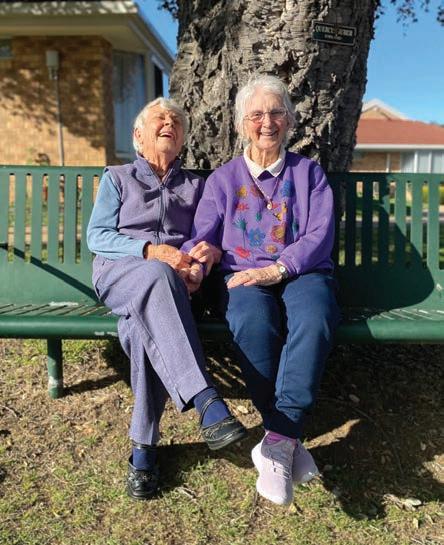
Queen Victoria Care is a community organisation that offers a range of services and accommodation options, with a focus on placing individuals at the centre of everything we do. Our services include residential aged care, independent living units, additional services and an onsite Wellness Centre.
Situated in the beautiful community of Lindisfarne on Hobart’s Eastern Shore, with sweeping water views of the River Derwent and blooming gardens, we have offered tailored aged care services for over 130 years. 13

www.qvcare.com.au
admin@qvcare.com.au facebook.com/QVCare
Accommodation payments are different from daily care fees. They are used by the aged care home as capital funding to improve the quality of the buildings and services they provide.
Not everyone pays an accommodation payment. It depends on the value of your assets and income at the time of entry into care.
If you have more than $59,500 in assets and income, you can be asked to pay an accommodation payment, but you must be left with at least $59,500 in assets after your payment (rates as of March 2024).
The means-tested care fee is an extra contribution on top of the other residential aged care payments, and the amount can differ from person to person.
The means-tested care fee will incorporate you financial assets and your income, and then determine how much you will be contributing to the cost of your personal and clinical care services.
This contribution amount can fluctuate depending on if your income or assets change.
There are annual and lifetime caps on the means-tested care fee. There an annual cap of $33,309.29 that will apply to your means-tested contribution to your care costs, together with a lifetime cap of $79,942.44 (March 2024 rates).
Depending on your personal financial situation, you may not have to pay this contribution towards the cost of your care.
If you can afford to, you will pay a basic fee of up to 85 percent of the maximum base rate of the Age Pension for a single person, a means-tested (your income and assets combined) contribution to your accommodation and a means-tested contribution to your care.
The maximum means-tested contribution will be allocated toward your accommodation payment until the full cost is paid and then toward your care fee.
Any income-tested contributions you may have made as a recipient of Home Care Packages will be taken into account in calculating lifetime care expenditure.
The family home will continue to be exempt from the aged care assets test if occupied by a spouse or other protected person.
Even when the value of your former home is included as an assessable asset, its value will be capped at $201,231.20 (March 2024 prices). It is only counted in determining your ability to pay for your accommodation.
When moving into an aged care home, if you have the capacity to contribute to the cost of your accommodation, you can now choose how you pay for it.
You have a choice of three options, however, if you start with one option and change your mind, you have up to 28 days from the date you move into the care home to decide how you wish to pay.
This is a single payment made to the care home and works similar to an interest-free loan.
The balance of the deposit is guaranteed to be refunded when you leave the home, but only after any amounts which have been used to pay for agreed services have been deducted.
In this option, you pay a periodic payment (usually on a monthly basis) for your accommodation; it is calculated based on the daily rate of the RAD.
To calculate the daily payment equivalent of the refundable deposit, the RAD is multiplied by the maximum permissible interest rate (MPIR) and divided by 365 days.
The MPIR is set by the government and is updated every three months –as of 1 April 2024, it is 8.34 percent.
The daily payment amount must be equivalent to the refundable deposit amount and is the maximum you can be charged per day for the room.
These periodical payments are not refunded when you leave the home.
If you wish, you can also choose to pay a combination of both a RAD and a DAP. For example, let’s assume the RAD is $400,000 but you want to only pay half of a deposit ($200,000) and the other as a DAP.
Use this formula to calculate the DAP:
(Balance of price x MPIR) / 365 = ($400,000 - $200,000) x 8.34% / 365 = $45.69 per day (MPIR from 1 April 2024).
Or use our easy to use fee estimator calculator on agedcareguide.com.au/nursing-home-fee-estimator
For further information, call My Aged Care on 1800 200 422 or Centrelink on 13 23 00, or discuss with a placement consultant or financial advisor.
Disclaimer - This information is a summary of the main provisions relating to aged care costs and while care has been taken to ensure that it is current on date of publication, it should not be taken as an authoritative source. Please phone 1800 200 422 for more complete, up-to-date information.
Many older Australians take up an aged care bed within one month of being assessed for residential aged care. This is often triggered by an unexpected event, such as a fall or a decline in health.
The financial decisions surrounding aged care may be overwhelming, due to the different funding mechanisms that apply.
You may want to know more about your options, the associated costs, how your Age Pension may be affected and whether you need to sell your home.
These can be further complicated by the impact that a move to care has in terms of the pension paid by Centrelink and the fact that the family home is treated differently for pension purposes than for aged care purposes.
Throw in the payment/deposit system — refundable accommodation deposit (RAD) or a daily accommodation payment (DAP) — negotiating various fees with a facility, filling in Centrelink forms and things can quickly become overwhelming.
Just getting a basic understanding of what forms you need to complete, when to complete them and where to send them can be difficult.
By understanding the rules and being able to apply them to individual circumstances, financial advisors are able to save their clients thousands of dollars.
Decide to sell your home before understanding the Age Pension and aged care fee impact.
Choose how you will pay the aged care fees before understanding all of your options.
Make untested or inaccurate assumptions about your ability to meet the aged care costs.
Allow or enable the dominant family member to influence the decisions.
Incorrectly assume that all decisions must be made before you can get the care needed.
Instead, seek help from a certified financial planner who is experienced in aged care.
The best financial strategies and options will depend on your specific circumstances, objectives and situation.
A financial advisor can help you focus on the information and issues that are important to you and your specific financial situation.
While every situation is different, there are some common elements of aged care financial advice which professional consultants often provide to their clients, including:
Strategies to fund accommodation payments
Financial modelling of multiple care options
Review and planning of tax implications
Maximising government pensions
Minimising nursing home fees
Negotiating with aged care facilities
Some important questions you should ask before engaging the services of a financial advisor include:
Do they specialise or have experience with aged care?
What licenses, credentials or other certifications do they have?
Will they provide their advice in ‘plain English’ and in writing?
Will they deal with the Department of Veterans’ Affairs or Centrelink?
How much do they charge?
Is the service a once-off or an ongoing service?
You should be open with your financial advisor about your financial situation and what assets are available, so your advisor can provide the best advice for your situation.
That is why, when choosing a financial advisor, you should also consider whether their decisions are considerate and measured as opposed to emotional or impulsive and actively listen.
Fees will vary and it pays to contact a number of experts for a quote on their services so you can compare.
While financial advisor services do cost money, the amount they can save you in the long run can make the advice and services worth it.
Seeking help from an expert means they will be able to access all the benefits and schemes available for your situation that you may not have known about.
If you’re experiencing financial difficulties and have little income, you may be able to receive free financial counselling services.
Operating from community organisations, financial counsellors can provide independent and confidential information, support and advice on a range of areas, including consumer credit law, bankruptcy and debt collection laws, industry hardship policies and government concession frameworks.
A financial counsellor may also be able to assist in negotiations with financial groups and creditors or budgeting and referrals.
Financial counsellors offer practical advice to people facing economic hardship, unlike financial planners who focus on wealth creation strategies.
You can find free and confidential services from a financial counsellor near you through the government’s MoneySmart website, along with dedicated financial counselling services for Aboriginal and Torres Strait Islander peoples from anywhere in Australia. Financial counselling is also available for farmers and rural or regional businesses at risk of fiscal hardship.
Find out more about financial counselling services in your state or territory on financialcounsellingaustralia.org.au or call the National Debt Helpline on 1800 007 007 to speak to a financial counsellor over the phone.
Disclaimer: The information in this book is general in nature and does not constitute legal or financial advice. Readers should seek their own personal legal and financial advice from a suitably qualified practitioner.

A well-prepared and executed estate plan can not only save your estate unnecessary costs in the future but can also save your loved ones from unnecessary stress after your death.
Estate planning is the process in which you discuss with a legal practitioner what you want to happen with your estate, known as your assets, when you die.
It is a plan that involves you considering who you want to be in charge of your will, who you want to benefit from your estate, your funeral wishes and who you want to look after your financial and personal/health matters if you were to lose capacity during your lifetime, for example, by way of dementia or stroke.
Effective estate planning ensures your assets are protected and distributed to the right people according to your wishes.
A properly drafted, up-to-date will is the only way that you can be sure your assets will be dealt with as you wish when you die.
In Tasmania, you must name an executor of your will who will carry out the terms you have laid out in your will after you die.
The executor of the estate can apply for a probate from the Supreme Court for permission to take control of the estate.
This means that the court has recognised the will as legally valid and will allow you to deal with the estate.
You don’t always need to get a probate, however, there can be situations where you may require a grant of probate. For example, an organisation may not release assets of the estate if they do not first see a grant of probate.
It’s important to update your will regularly, for instance, if you get married your will is automatically revoked.
On the other hand, getting a divorce does not revoke your will but it does prevent them being appointed as a trustee or receiving any gifts through your estate.
In Tasmania, if you die without a valid will, your estate will be treated as an ‘intestate’ and the Public Trustee will be responsible for the estate unless someone is granted letters of administration.
The only way to ensure that your loved ones are protected is to obtain proper legal advice regarding your estate planning.
To find out more information, visit the website of the Tasmania Public Trustee at Trustee at publictrustee.tas.gov.au.

The aged care assessment will help decide what level of support you require. Your assessor will best be able to help you if you provide lots of information about yourself and what day-to-day tasks you struggle with.
The assessment will be done by a social worker, nurse, doctor or other health professional and can take an hour or so.
If the My Aged Care contact centre believes that you are eligible for basic home support, you will be assessed by a professional from the Regional Assessment Service (RAS).
If you require higher care support, a member of an Aged Care Assessment Team (ACAT) will visit you at home to assess you for a higher level of support to meet your needs or a place in a residential care home.
Some of the documents and information you should collect before your assessment include:
Medicare card and a form of identification, for instance, Department of Veterans’ Affairs (DVA) card, driver’s licence, passport or healthcare card
Notes or referrals from your doctor
Information about previous home, community or aged care services you have received
Details about support you receive from family, friends or the community
Prepared questions and information about aged care that you wish to discuss with the assessor so you have a better understanding about services
The contact details of your doctor and any other health professionals you see regularly
A translator or Auslan interpreter arranged if you require one
A support person to be present for the assessment if you want one
During a face-to-face assessment, an ACAT assessor will visit you in your home to get to know you and your circumstances and determine the types of support you need.
The assessor will ask you a number of questions about any supports you receive, your current lifestyle, any health concerns or chronic illnesses, how you deal with tasks at home, if you are struggling with any cognitive issues or memory loss, whether you are struggling at home or have concerns about personal safety, in addition to any activities you engage in with family or in the community.
Topics that might be covered or that you may want to bring up during your assessment include your: medical history;
living arrangements; support network; existing forms of support and services; cognitive and behavioural functions; ability to perform daily tasks; health and lifestyle concerns.
Be open and transparent about your wishes and what you believe will be of assistance around the home. They might also ask for your permission to talk with your doctor or specialist about the impact of any health conditions on your day-to-day life.
The assessment is also an opportunity for you to ask questions — if you don’t understand something, make sure you clarify with your assessor You shouldn’t be leaving your assessment confused or stressed.
Some of the questions you may want to ask are:
What are my rights and responsibilities during this assessment process?
What services are available in my area?
Are there support options available for my carer?
What financial assistance am I eligible to receive?
Are there culturally appropriate services in the area?
Who can I contact if I have any questions after the assessment?
If you don’t want to receive government-funded home care or go into government-funded aged care, then that is perfectly fine. There are private providers who don’t require any assessment to receive care or enter their facilities. However, you can’t receive government funding to pay for your stay in a private nursing home.
The ACAT assessment will take around an hour and at the end of the meeting the assessor will discuss the results of the assessment with you. They will review the information you have provided to determine what support option best suits you.
You will receive a letter within two weeks of your assessment to let you know if you have been found eligible for aged care services. This letter will also detail the types of services you will be able to access and any further information about how to access these supports.
If your situation is urgent, it may only take a couple of days before you get confirmation of approval for aged care.
You’ll be given a referral code linked to the type of service you are eligible to access. The service provider or aged care home of your choice will need this referral code to access your information with My Aged Care and manage the referral. They’ll also be able to access the funding allocated to you.
When you’re ready to start looking for providers to deliver the support services you have been found eligible for, you can use our online directory at AgedCareGuide.com.au for a comprehensive overview of the care options and care providers available near you.
Being approved for funded supports doesn’t always mean you will be able to access services straight away. You may need to wait until a suitable package or place in an aged care home comes available, and wait times can range from a few weeks to a number of months.
You have the final decision to accept or reject an ACAT recommendation.
If you are unhappy with the recommendations, first talk with the person in charge of the ACAT; most concerns can be resolved this way.
If you can’t come to an agreement, you can appeal the decision and have the assessment reviewed.
To have the decision reviewed, you must write to the Secretary of the Australian Department of Health within 28 days of your assessment letter arriving. The request should be answered within 90 days with a decision.
If you do not agree with the secretary’s review, you can escalate the matter further by contacting the Administrative Appeals Tribunal.
While asking for a review by the secretary is free, the Administrative Appeals Tribunal does incur a charge.


Once you have been assessed and approved for government-funded aged care, either for services in your own home or a place in an aged care home, you can start the process of finding a provider that suits your needs.
Your letter from My Aged Care confirming you are ready to start accessing services will include a referral code linked to the type of service you are eligible to access. If you need the support of multiple services, you will be given multiple referral codes, one for each service.
The service provider or aged care home of your choice will need this referral code to access your information with My Aged Care and manage the referral. They’ll also be able to access the funding allocated to you.
Choosing which provider to trust with providing support is an important and personal decision — one that you want to think carefully about and shouldn’t rush.
You may want to start by writing down what you are looking for in a provider and what is important to you. Are low fees important to you or would you like a provider who can support your cultural needs? If accessing home care, do you want the same support worker to assist you each time and do you want to receive support on specific days or are you more flexible with time?
It’s a good idea to discuss your wishes and options with your family and support network, as they may be able to help you research, provide independent opinions on providers or share personal experiences.
It’s useful to create a shortlist of providers in your local area, which may help narrow down your search.
When considering a potential provider, take your time to do some research:
Look at the provider’s website, social media pages and online reviews.
Check out their credentials, such as quality certifications and industry awards.
Do they have any past or present sanctions or notices of non-compliance?
You can ask them directly or check the government’s non-compliance finder tool at myagedcare.gov.au/ non-compliance-checker.
You can use this Guide or the AgedCareGuide.com.au directory online to search for service providers in your area that meet your requirements.
If you aren’t comfortable finding or choosing a provider by yourself, there are experts who can help you find a nursing home that suits your needs and preferences. A placement consultant has knowledge of local aged care facilities and can make the process of entering aged care smoother. Find a placement consultant on AgedCareGuide.com.au or call 1300 606 781 to access placement services.
Once you have chosen a provider, you will need to contact them to start the home care services you need or to be placed on their waiting list for a bed vacancy. During this conversation, it is also essential to discuss fees and services with your new provider so you know how much the support or aged care bed is going to cost.
When looking into home care services, here are some things to investigate and ask the provider you are considering:
Do they service your area?
Is the company Australian-owned?
Is it independent or part of a franchise?
Do the owners/operators have experience in home care?
Does the company have appropriate insurance?
Does the company comply with Australian tax law? For example, does it charge GST appropriately?
Do they provide documents about financial arrangements before service begins?
Do they have a service agreement to help you understand the services and costs involved?
Are they flexible? After all, it is all about you.
What are their recruitment processes?
Is there a criminal background check performed prior to employment with an agency?
Does the company provide workers compensation for employees? This is important so that you are not responsible for any injuries that occur on the job.
How do they determine appropriate staff for your needs? If a company asks where you live and then offers you staff before even hearing about your needs, you can be reasonably assured they allocate based on location as a priority.
Is it possible to interview potential carers and make a selection after those interviews?
Do you get to decide what times and days suit your needs?
What is the minimum shift length?
Do they have male/female workers and can they cater for specific cultural backgrounds?
Who will be working in the home? Will there be regular staff providing continuity of care or do they change shifts around?
Is there a professional staff member, such as a registered nurse, who liaises with you to create a plan that meets your needs?
Who is the organisation’s main contact for you?
Do you meet a manager / owner and then never hear from them again? What additional support is offered within the cost of your care? For example, are they available 24/7?
You’ll find a list of in-home care service providers from page 84 in this Guide or visit AgedCareGuide.com.au to find providers servicing your location.
Needing to place a loved one into an aged care home can be a highly stressful event for families and carers.
You might think it’s a lack of information or understanding, but it’s because you are both the carer and the person emotionally involved, as well as the decision maker.
This process can be eased significantly with the help of an aged care placement consultant who can take control of the running around, paperwork and planning.
Moving into residential care is a situation most people postpone for as long as possible until the point of necessity, often leaving little time to organise everything.
If some initial planning were to be undertaken, it could soothe the transition and reduce the stress at what is a critical turning point in people’s lives.
Planning should include obtaining information on the financial implications of entering residential care, gaining information on the facilities available in your area and ensuring wills, powers of attorney and guardianship are up-to-date.
A placement consultant can take over a lot of the stress of searching for and transitioning into an aged care home.
These professionals can also assist you in finding a bed placement more promptly because of their connections with aged care providers and services.
Every single transition to aged care is unique and a placement consultant will take several things in consideration to make sure the advice is right for your circumstances:
Are you looking for care options for a single person or a couple?
Is there a physical condition that is deteriorating, are mental faculties and awareness impaired?
Is there acceptance or understanding of this part of the journey? What are the family dynamics around the placement decision and the impact on everyone involved?
Having extensive knowledge of facilities in their area, as well as the placement process, an aged care placement consultant can often find a home faster, and one that is specially suited to your requirements.
Through their established relationships with aged care homes, they are familiar with the culture of each home and, most importantly, they have advanced knowledge when vacancies become available.
By knowing the culture of each facility and getting to know you, placement consultants can determine which homes would best suit your needs and preferences, and make prior applications to these homes. Without the assistance of an aged care placement consultant, you or your carer would need to constantly phone the facilities of your choice to demonstrate your eagerness and commitment to obtaining a bed in that home.
The aged care placement consultant advocates on behalf of you and your family and is able to assist with the whole assessment process. They also complete all the necessary paperwork and application forms for entry into an aged care home which is helpful, as the applications can be quite daunting. They may suggest seeking financial advice where required.
An aged care placement consultant helps share the load at this crucial time, can significantly speed up the time it usually takes to find a placement at a suitable home, thereby easing the transition into residential care.
Be sure about your expectations of service and what the placement consultant is able to provide, including:
Face-to-face family meetings to discuss your situation and a respect for the emotions of all the family members involved
Support and recommendations that cater for the specific requirements of your family and loved one
Counsel that prioritises family sensitivities, needs and special requests, before asking how much money is available and getting the status of the financial situation
Practical assistance with urgent placement situations — which they often are — where reducing the typical waiting times or arranging respite care is a necessity
There are many qualified placement consultants within Tasmania who can help you in your aged care journey.
When you’re choosing a placement consultant to support you through the aged care transition, look for someone who is an expert in building and nurturing relationships, who is unbiased and independent and has no business investment or alignment with any aged care facility.
An independent professional is able to provide guidance based entirely on your individual circumstances, not biased by commission or kickbacks from any particular facility or provider.
Choose an advocate who will ease your concerns, supporting your family with all aspects of this transition, allowing you to focus on your loved one. Placement consultants are most happy for you to call them for a chat and understand you may talk to a number of them before making your choice. You can be open in your discussions because, as health professionals, they have a policy of confidentiality.
Their professional fees may differ and it is reasonable to advise them if you are working to a budget.
Some placement consultants charge by the hour, whilst others offer a package of services for one fixed price. Ensure that you are advised of all the possible fees and costs up front.
Finally, make sure you feel comfortable talking with the placement consultant, because your professional relationship will rely on them understanding what you want and organising the appropriate care services to meet those needs.
Placing a family member into care can be life-changing. There are many factors — physical, social, psychological and financial — that may arise which families sometimes find too difficult to cope with by themselves. Each family member may want their opinion to be considered when it comes to making important decisions. There are specialist health professionals who offer independent, non-judgmental services that can explore the subtleties of each situation and offer caring support in addition to counselling and conflict resolution.
The journey into aged care is often a challenging and emotional time. Not only for you, the person going into care, but also for family members who have sometimes cared for their loved one for a long time.
You may feel rejected and unloved, scared to take the step of going into care and worried you’ll lose your independence.
At the same time, many family members feel guilty about not being able to look after their loved one anymore. They feel overwhelmed by the aged care system and can’t give the assistance that is required.
Finding professional support may relieve you from negative beliefs and provide you with coping skills which can ease the difficult journey towards placing a loved one in care.
Some placement consultants offer counselling as part of their services or may be able to refer you to a counsellor.
You can find placement consultants in the products and services directory on page 101 or search on AgedCareGuide.com.au.
The case management process uses a comprehensive approach to identify and implement health and social care services to optimise your health, quality of life and active participation in the community.
Case management may be short, long-term or episodic. It plans for both current situations and your long-term needs.
Case managers work in partnership with you, your carer and family, as well as other service providers to develop and implement individualised care plans and strategies best suited to your needs and goals.
Health-based case managers are usually a nurse, social worker or allied health professional.
Community-based case managers generally have skills from a range of disciplines, such as social work, behavioural science, allied health or nursing.


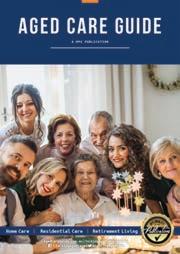









If you are eligible for a government-funded care package, case managers are often assigned through your service provider as part of your Home Care Package or home care services.
However, If you have complex and multiple needs and you’re looking at different care options or you would prefer not to use a government-funded package, you may choose to use the services of a private case manager.
Private case management services are supplied by experienced, tertiary-qualified case managers, to provide support services and coordination across a wide range of community and supportive health services.
Waiting periods for private case management are generally reduced compared to some government-subsidised services.
The duration of private case management is flexible and may be short-term or ongoing, depending on your needs.
The service of a private case management is not government-subsidised in any way, so you will be charged for all services.
Hourly rates vary between private case management organisations, so always ask for a breakdown of costs before employing them.
Generally, an invoice for all care services purchased on your behalf will be provided to you each month.
Many case managers offer no-lock-in contracts, meaning care can be arranged for one, several or many ongoing visits and you only pay for what you use.
The aim of care planning is to provide appropriate and coordinated care that you have control over. Care plans are person-centred and prioritise the needs identified in the comprehensive assessment.
The case manager implements the care plan and this may include identifying support services that other community care agencies will provide.
Services may include the purchase or hire of equipment or installation of assistive aids, such as bathroom rails and negotiating with support agencies for delivery of services.
The case manager also monitors each individual to ensure the service provision is effective and financially accountable, to identify changes and make adjustments to the care plan if needed.
24-Hour On-site Supervision – A person(s) who is/are employed to live in or in close vicinity of a retirement village and will respond to requests for assistance when regular staff are off duty.
Aged Care Assessment Team (ACAT) – Assess and approve older people for Australian Government-subsidised aged care services.
Aged Care On Site – The retirement village has an aged care facility at the same location.
ATSI – Services offered to Aboriginal and Torres Strait Islander older aged people and their carers.
Booked Respite Beds – At least one bed at the facility is allocated to respite and eligible people can contact the facility to book a respite stay in advance. Prior assessment by an Aged Care Assessment Team required.
CALD – Services offered to Culturally and Linguistically Diverse aged people and their carers.
Care Community (CC) – Private self-contained accommodation run by approved providers where you can access additional care or support packages as a genuine alternative to a nursing home.
Care Plan – Developed by the service providing your care and outlines care needs and instructions on how these needs will be met.
Centre-based Care (CBC) – Services, respite, and activities for social and recreational independence in a ‘centre setting’ for aged/frail clients and their carers.
CHSP Funded – An in-home or centre-based care service funded by the Commonwealth Home Support Programme government initiative.
Communal facilities – Shared facilities for residents such as community hall, swimming pool or bowling green.
Consumer-directed Care (CDC) – Allows you to control the types of care you access, how it is delivered, and who provides that care. All Home Care Packages are delivered on a CDC basis.
Daily Accommodation Payment (DAP) – This is a daily payment to a government-funded aged care facility, paid periodically i.e. monthly. This is not a refundable payment.
Day Therapy Centre (DTC) – Allied health/therapy services to develop or maintain physical and psychological independence in a ‘centre setting,’ provided to aged/frail clients and their carers. Includes clients with dementia and disabilities.
Dementia Services – Services offered to clients with dementia and/or challenging behaviours, as well as their carers.
Domestic Assistance – Help with: washing clothes, dishes, floors, wet areas; ironing, minor meal preparation, vacuuming, changing bed linen, dusting and cleaning living areas.
Donor Funded – The purchase price or entry contribution, of a dwelling by a resident in a retirement village, may be subsidised by a not-for-profit organisation.
DVA Services – Programs and services that can be accessed with funding from the Department of Veterans' Affairs.
Extra Services Beds/Places – Places at an aged care facility for which residents receive a higher standard of accommodation, food and services for an additional charge.
Health Services – Can include dental, exercise therapy, medical practitioners, nutrition, occupational therapy, optical, podiatry, physiotherapy or speech therapy services that are delivered on site.
Home Maintenance/Gardening – Assistance with replacement of tap washers, light globes, minor weeding/ pruning, sweeping of outdoor areas, minor carpentry repairs and gutter cleaning.
Independent Living Unit (ILU) – Sometimes referred to as a villa or apartment and located in a retirement village.
LGBTIQ – Some aged care services offer specific care to Lesbian, Gay, Bisexual, Transgender, Intersex and Questioning residents.
Licence to Occupy – A form of retirement living tenure that gives residents the right to occupy a residence without having ownership of it.
Meals &/or Shopping – Delivery of daily cooked or frozen ready-to-eat meals, or transport to the shops and assistance provided, or having someone to do the shopping. In a CBC setting this refers to meals or light refreshments provided at the centres.
Medication Supervision – Service provider attends the client’s home daily to assist in dispensing medication.
Multi-purpose Service (MPS) – Located in centre settings and some residential aged care facilities. They deliver a mix of aged care, health and community services.
NESB – Services offered to Non-English Speaking Background older aged people and their carers.
Non-dedicated Respite – The residential aged care facility does not have a dedicated room for respite. These facilities only offer respite when they have accommodation available.
Palliative Care – Providing care to patients living with a life limiting illness, supporting and improving patients quality of life by addressing medication and pain management. Can be provided at home, in a residential care setting or in a specialist palliative care service like a hospice.
Personal Care – Assistance with personal hygiene, washing, showering, bathing, dressing, feeding and toileting. In a CBC setting personal care is offered while the client is at the centre.
Pharmaceutical Deliveries – The delivery of medications by a service provider directly to the client or older person's home.
Privately Funded – Non-government-funded residential aged care facilities known as 'supported-' or 'assistedliving complexes,' 'independent living units' and 'serviced apartments.'. No ACAT is needed prior to a person entering the home.
Purchase – Residents buy a loan/licence agreement for a dwelling in a retirement village or purchase on a freehold basis.
RAD/DAP Combination – This includes both partial lump sum and daily payments for aged care accommodation.
Refundable Accommodation Deposit (RAD) – This is paid as a lump sum when entering a government-funded aged care facility and refunded, minus agreed deductions, when leaving the facility.
Registered Nurse – Senior nurses who care for the sick and injured in hospitals and other health care facilities, doctors’ surgeries and private homes.
Regional Assessment Service (RAS) – In-home assessments of new and existing clients/carers for CHSP services.
Rental Accommodation (RA) – Villas, units or ILUs available for rent in a retirement village.
Resident Funded/Purchase – Residents purchase a loan/ licence agreement for a dwelling in a retirement village or purchase on a freehold basis.
Respite Care – Services provided so a client or their carer can take a break from their daily routine. Includes care in the client’s home, at a day centre or in an aged care facility.
Retirement Living (RL) – The site has retirement living accommodation.
Secure Dementia Unit – Secure specialised ward, wing or unit for people with dementia and/or challenging behaviours.
Service Fee – A fee to cover the services offered by a retirement village, including maintenance, improvements, utilities and council rates etc.
Serviced Apartment – Usually one or two bedrooms and provides residents with some domestic and ‘hotel-like’ services such as cleaning, laundry and personal care. Services may be provided on a fee-for-service basis.
Single Bedrooms with Ensuites – This facility offers a number of single bedrooms with an attached bathroom. Might not be every room in the home.
Small Pets Welcome – The site has a policy for residents enabling them to have small pets but it's dependent on the type, size and care needs.
Social &/or Recreational Support – The client participates in social or recreational activities either in their home or at a community, day or recreational centre.
Supported Residential Services (SRS) – Privately run aged care facility that provides similar accommodation and care to that of a Government funded facility but without the funding support.
Supported & Assisted Living (SL) – Supported- & assisted-living communities offer accommodation and care to residents on a fee-for-service basis without government funding.
Transport – Organising or providing transport services such as bus, taxi, private car, etc. In a CBC setting this refers to transport to and from the centre.
VHC Services – Programs and services for veterans that can be accessed through the Veterans' Home Care program.
See Definition of Terms page
See Definition of Terms page 82-83
The tables below provide you with an alphabetised list of LGAs and the page reference where you can find details about aged care homes and home care packages in that local government area (commonly referred to as a Council District).
90-92
A list of suburbs and the page references where all the aged care homes in that suburb are listed. If a suburb/town is not listed, please refer to the next closest suburb.
Aged Care Assessment Teams (ACAT) are responsible for all assessments for government-funded aged care and Home Care Packages. This list provides you with the council/local government area that each ACAT services. All assessments are coordinated through My Aged Care. Call 1800 200 422 if you would like to organise an assessment.
Burnie, Central Coast, Circular Head, Devonport, Kentish, King Island, Latrobe, Waratah-Wynyard, West Coast
Break O’Day, Dorset, Flinders, George Town, Launceston, Meander Valley, Northern Midlands, West Tamar
Brighton, Central Highlands, Clarence, Derwent Valley, Glamorgan-Spring Bay, Glenorchy, Hobart, Huon Valley, Kingborough, Sorell, Southern Midlands, Tasman
Approved Home Care Package providers deliver home care and support services to members of the community who live at home.
If you’ve been approved for a government-funded Home Care Package of any type, you may approach any approved Home Care Package provider to offer the services you need.
Some providers may only offer services in one region while others can service multiple areas.
On the following pages you’ll find alphabetised lists of approved providers in Tasmania.
To help you know which approved providers offer services in a certain region, we’ve included coloured bars down the left-hand side of the directory pages.
The reference tables are organised in three regions: North Western, Northern and Southern.
The list below is a quick reference guide to help you find in which group council districts are listed. For example: Launceston LGA is grouped under Northern.
Page 88 is a colour-coded map of Tasmania to show you which council districts are grouped together.
Council District Region
Break O'Day Northern
Brighton Southern
Burnie North West
Central Coast North West
Central Highlands Southern
Circular Head North West
Clarence Southern
Derwent Valley Southern
Devonport North West
Dorset Northern
Flinders Northern
George Town Northern
Glamorgan-Spring Bay Southern
Glenorchy Southern
Hobart Southern
Council District Region
Huon Valley Southern
Kentish North West
King Island North West
Kingborough Southern
Latrobe North West
Launceston Northern
Meander Valley Northern
Northern Midlands Northern
Sorell Southern
Southern Midlands Southern
Tasman Southern
Waratah-Wynyard North West
West Coast North West
West Tamar Northern
H O M E C A R E P A C K A G E S
The table on the next few pages lists approved HCP providers in alphabetical order, detailing the HCP levels they offer and if they offer any package supplements.
Ethnicity, country or cultural groups listed under ‘Notes’ applies to all package levels in that row. If service providers have an advertisement in this Guide, then the page number of the advert is listed in red under ‘Advert Page.’ The ‘DPS Web ID’ number can be used as a unique identifier to find out more information on AgedCareGuide.com.au.
The same type of care and services are provided under each HCP level of care and these may include transport, domestic assistance, social support, personal care, home maintenance, home modification, nursing care, food services and medication assistance.
The hours of care are increased at each level of care, i.e. more hours of care and services are provided under HCP Level 4 and the least under HCP Level 1.
Based on your care needs, an ACAT assessment will determine what level of care you are eligible for and if any supplements apply to you.
These icons help you find the packages that are most suitable for you.
General packages suitable for all eligible clients
Packages for people with dementia
Packages for people who are financially or socially disadvantaged
Packages for people with housing needs and at risk of homelessness
Packages for people who live in rural, remote or isolated areas
Packages for veterans

Icons in the residential listings represent various types of services available in aged care facilities.
Booked Respite Beds — Dedicated respite beds that should be booked in advance. Prior assessment by an Aged Care Assessment Team (ACAT) is required.
Extra Services — A service offering a ‘higher’ standard of accommodation, including increased entertainment and food choices at an additional cost to the resident.
Pets on Premises — The facility owns dogs or cats that are able to interact freely with residents. Some facilities may consider you bringing your small pets.
Secure Dementia Unit — Safe and secure wing or unit of the aged care facility offering specialised care to those living with dementia.
Secure Garden — An on-site secure gated garden for residents (especially those with dementia) to enjoy for recreation or therapy.
Specialist Palliative Care — Specialised care services for those nearing the end of their life in an aged care facility. Staff are trained in pain management and other palliative care measures. Transition Care Beds — A bed-based service allowing older people more time and support post-hospitalisation in a ‘non-hospital’ environment to optimise their functional capacity.
Culturally Specific — Care services catering to the needs of those from non-English speaking or culturally and linguistically diverse backgrounds. Seldom exclusive, for example: all people are welcome. The home has special knowledge of the referenced culture or group.
Retirement Living Onsite — Retirement living services/village co-located on the same geographic site as the aged care facility.
North Western Aged Care Homes listed by Councils (LGAs) and then Suburbs
BURNIE Council
Burnie 7320
Penguin 7316
Smithton 7330
7310
7315
7310
7306
7256
Latrobe 7307
Uniting AgeWell Latrobe
Strathdevon
Port Sorell 7307
7322
7325
Queenstown 7467

Northern Aged Care Homes listed by Councils (LGAs) and then Suburbs
St Helens 7216
7260
7255
7253
7249
7248
7250
7249
7250
7249
MEANDER VALLEY Council
Deloraine 7304
7250
NORTHERN MIDLANDS Council Campbell Town 7210
Longford 7301
Northern Aged Care Homes listed by Councils (LGAs) and then Suburbs
WEST TAMAR Council
Beaconsfield 7270
Legana 7277
Riverside 7250
7017
7015
7018
7018
7190
7011
Claremont 7011
Note: 1. Interconnecting rooms
7010
7008
Sandy Bay 7005
South Hobart 7004
VALLEY Council Dover 7117
7113
Bay 7052
Kingston 7050
Snug 7054
Council
Sorell 7172
MIDLANDS Council
Oatlands 7120
Council
Nubeena 7184
Table of aged care homes/residential care facilities offering culturally appropriate services
The following table is a guide only. The information should not be interpreted that these homes are exclusive to the noted cultural group nor the only homes that offer quality services to these cultural groups. All aged care homes should care for all people regardless of sexuality, race or religious characteristics. The homes listed below have directly indicated to DPS that they have specific training, expertise, funding or heightened understanding of the special needs of the cultural group.
6243 3100 15507
ATSI Uniting AgeWell Latrobe Community, Strathdevon Latrobe 7038 0400 15485
Glenview Community Services Glenorchy 6277 8800 15512 CALD Queen Victoria Home Residential Care Lindisfarne 6243 3100 15507 CALD Southern Cross Care Ainslie Low Head Low Head 6208 5100 15432 CALD Southern Cross Care Glenara Lakes Youngtown 6343 6777 15446 CALD Southern Cross Care Guilford Young Grove Sandy Bay 6225 1025 15511
Southern Cross Care Rivulet South Hobart 6221 2200 15465
Southern Cross Care Sandown Apartments Sandy Bay 6216 7100 15477
Southern Cross Care Yaraandoo Somerset 6435 1010 15436
Glenview
Glenorchy 6277 8800 15512
3100 15507

Table of Home Care Package (HCP) providers offering culturally appropriate services
The following table is a guide only. The information should not be interpreted that these Home Care Packages are exclusive to the noted cultural group nor the only packages that offer quality services to these cultural groups. All Home Care Packages are tailored to care for all people regardless of sexuality, race or religious characteristics. The service providers of these Home Care Packages, listed below, have directly indicated to DPS that they have specific training, expertise, funding or heightened understanding of the special needs of the cultural group.
African Abigail Mamas Healthcare Services
0401 093 396 65824
Arabic Abigail Mamas Healthcare Services 0401 093 396 65824
Asian Abigail Mamas Healthcare Services 0401 093 396 65824
ATSI Family Based Care Tasmania 1800 684 098 19162
ATSI Karadi Aboriginal Corporation Aged Care 6272 3511 17559
ATSI SETAC Community Care 6295 1125 17550
ATSI Trilogy Care 1300 459 190 62701
ATSI Uniting AgeWell Tasmania North West Home Care 6715 7000 17554
Austrian Abigail Mamas Healthcare Services 0401 093 396 65824
Bhutanese Community Care TASMANIA
1300 722 400 17525
Bosnian MCWA - Aged Care With A Difference 9318 1111 22041
CALD Community Care TASMANIA
1300 722 400 17525
CALD Family Based Care Tasmania 1800 684 098 19162
CALD Glenview Home Care 6277 8800 17533
CALD MCWA - Aged Care With A Difference 9318 1111 22041
CALD Migrant Resource Centre Home Care 6221 0999 17545
CALD The Parkside Foundation Home Care Packages 6243 6044 17547
CALD Trilogy Care 1300 459 190 62701
CALD Uniting AgeWell Tasmania South Home Care 6289 8800 17528
Chinese Family Based Care Tasmania 1800 684 098 19162
Croatian MCWA - Aged Care With A Difference 9318 1111 22041
European MCWA - Aged Care With A Difference 9318 1111 22041
Filipino Family Based Care Tasmania 1800 684 098 19162
684
See Definition of Terms page 82
Advocacy
Family
ASSESSMENTS
Calvary
Just
Calvary
Calvary

Throughout your aged care journey, there may come a time where you need to make changes to the services you are receiving.
This may be because you’re going on a holiday or need to go into hospital and don’t need any services to be delivered while you’re away. Perhaps your needs have changed and your current supports no longer suit you. Alternatively, you may like to change providers, either because you’re moving to a different area or because you’re not entirely happy with your current provider.
The process of making changes to your current services depends on the type of support you are receiving. However, the first step should be to talk with your current provider.
Service providers have an ongoing responsibility to make sure you receive quality care and to respect your rights and preferences. They should monitor the services they provide under your care plan to ensure your needs and goals are being met. If there are significant changes in your care needs they can help you through the process of reviewing your supports.
Reviewing your needs and supports may mean that you need to have another aged care assessment. For example, if you were originally assessed as having low-level care needs but your mobility has decreased over time and you would like to access higher-level supports.
You can request a reassessment by your local ACAT to determine if you’re eligible for higher-level care. You must be reassessed to move on from CHSP supports and between different levels of Home Care Packages. Depending on the services you’re already receiving, you may need to consider other options, such as:
Reviewing your care plan to identify alternative support options and priorities, for example: replacing informal supports with formal supports or considering additional support services, such as support on weekends
Purchasing additional private services
Utilising residential care, either as short-term respite to complement your package or as a long-term option
If your current provider can’t offer the services or changes you want, you can switch to a different provider that can meet your needs. When choosing a new provider:
Take the time to research a new provider to make sure they can meet your needs
Contact My Aged Care to get a new referral code to give to your new provider and agree on a date to switch your services
Notify your current provider, in writing, to let them know you will be terminating your services with them and from what date
Be mindful that your current provider may charge an exit fee to cover any administrative costs. Exit fees may vary between providers and the amount should be clearly indicated in your care agreement.
After making decisions for yourself throughout your adult life, it makes sense that you would want to maintain that control by self-managing your Home Care Package (HCP).
You may decide to organise and manage the coordination of your own supports in your package rather than utilise a case manager who would commonly deal with your package on your behalf and direct the care and support you receive.
As a consumer, you have every right to exercise that freedom to self-manage your package.
Some people who self-manage their own package find they have more choice and control over their HCP than before.
Additionally, people who self-manage their care can cut down on the administration costs and case management fees that they would normally have to pay. This means more of your package funding can go towards the care and services you require.
When you self-manage your HCP, you get to choose an approved provider, pick and manage your support workers, decide when you want to receive these services and negotiate how much you pay for the provided services.
Choosing to self-manage your own package doesn’t mean you are doing this all by yourself either. The provider you choose will assist you in receiving the correct care and services.
Your provider has an obligation to provide you with all the information you need to successfully self-manage your HCP and support you through the self-managing process.
You will work in partnership with your provider to decide how involved you want to be when it comes to managing your care.
This means you can set boundaries and expectations with your provider on what they should be covering and what tasks you will be organising.
When considering self-management of your package, you need to consider whether you have the time and energy to undertake this role.
For instance, if you have been diagnosed with dementia, it may not be the best option for you. However, you can ask your partner or loved one to self-manage your package on your behalf.
It is important to keep in mind that some providers may have policies around self-management, so you should definitely shop around and enquire with providers about how they support clients who wish to self-manage their package.
The resident agreement is a legal agreement between you and your aged care home.
You will be provided with a resident agreement to sign, which may cover the services and fees you receive, along with your rights, as a resident of the aged care home you move into.
Your resident agreement should include the following: the policies and practices used to set your fees and charges; the level of daily fee you’ll be asked to pay; any extra services you’ve agreed to receive and their costs; any circumstances where you might be asked to leave and how the aged care home will help you find somewhere more appropriate; your rights and responsibilities as a resident of your new aged care home; your aged care home’s responsibilities to you as a resident; how the aged care home will deal with any complaints you, your carer, friends or family may make; and any other matters agreed between you and the aged care home’s manager, within the requirements of the Aged Care Act 1997.
If you choose to enter into a resident agreement, you don’t have to sign it at the time it is offered. You may want to take time to ask your friends, family, carer, financial advisor or legal practitioner for help to go through the agreement, although you don’t have to.
While there is no time limit for signing the resident agreement, it is in your best interest to finalise the resident agreement as soon as you can, as it covers your rights and responsibilities.
Since the resident agreement is a legally binding document, it’s important you understand everything in the document before you sign it.
If you have any questions, you should ask your new aged care home. It’s their responsibility to make sure the agreement offered to you is clear. You can also ask your family, friends, carer or a legal practitioner to help you understand the terms of your agreement.
If you understand your agreement and want to sign it, but are physically unable to, you can ask someone with the legal authority to sign on your behalf, such as someone who holds your power of attorney.
Should you change your mind, you can withdraw from the resident agreement within 14 days of signing by notifying your aged care home of your decision in writing. You will still need to pay your care fees and charges for care you’ve received during the 14 days.
Changes can only be made to the agreement if both you and your aged care home agree.
Some aged care homes provide ‘extra services,’ such as a higher standard of accommodation, increased entertainment options and more diverse food choices.
Some homes may have approval from the Australian Government to offer additional ‘hotel-like’ services at an additional cost to the resident.
‘Extra service’ only refers to the standard of accommodation, meals, food and entertainment, not to the level of care which is legislated to be of a high standard across all aged care homes.
Services delivered and cost may vary between providers and they should be outlined in your resident agreement.
In some cases, the entire home is ‘extra service,’ while in others, a distinct part of that home, such as a separate building, wing or unit is dedicated to extra services.
Some of the extra services you might be offered include:
A bigger room Internet
Daily newspaper Satellite-TV
Phone
Choice of meals
Selection of beverages, including wines, beer and spirits
Special therapies, such as massage or aromatherapy
Leisure/entertainment facilities
Extra service fees are set by the provider and approved by the Australian Government. This is an additional charge on top of the basic daily care fee, accommodation payment and any means-tested fee.
Some providers may offer rooms with a non-optional extra service package. You can only take up the room if you agree to and pay for the extra services offered.
Other providers may offer extra services as an optional package that you can choose or cancel at any time.
In this case, switching from general residency to extra service residency within the same home does not change the accommodation payment you have already agreed to when entering the home and the provider can’t charge a new or additional accommodation payment.
All people in aged care homes have the option to purchase additional services, such as entertainment or lifestyle choices, for an extra fee. Providers can not charge additional service fees for anything that is part of the normal operation of the nursing home and you have to agree to these charges before they are being delivered.
Aged care homes that offer extra services are listed in the residential table starting on page 94.
For many older Australians, leaving their home to move into residential care is a lifestyle change that can lead to an emotionally challenging experience.
This transition can become more challenging for older people from culturally and linguistically diverse (CALD) backgrounds requiring access to residential and community aged care services that are sensitive to meeting their specific cultural, spiritual, dietary and linguistic needs.
With an increasing ageing and migration population, it is essential that Australian aged care services and communities have the capacity to respond to the unique needs of people from CALD backgrounds.
Meeting the needs of the nation’s older people from CALD backgrounds has been a growing focus of the Australian Government.
Providing suitable cultural care has been associated with huge health and wellbeing benefits for this growing group of older Australians, which has led to the government’s introduction of a number of initiatives.
Facilities with clusters for CALD older people generally consist of three or more residents from a similar background and staff who speak their language.
Cluster facilities also make an extra effort to focus on meeting the cultural, spiritual, dietary and social needs of CALD residents.
The aim of clustering is to:
Enhance the quality of care provided to residents from CALD backgrounds in residential aged care facilities
Promote and facilitate access to residential aged care facilities for people from CALD backgrounds
Enable residents to observe religious, spiritual, cultural and personally significant events
Improve communication between staff and residents
Maintain dietary customs according to the CALD backgrounds of residents’ religious and cultural preferences
Provide social and activity programs that appropriately cater for the needs and interests of CALD residents
There are also culturally specific aged care facilities that have formally entered into a contract with the Australian Government to, wherever possible, meet the needs of a specific cultural group.
Partners in Culturally Appropriate Care (PICAC) is a national initiative, funded by the Australian Government, designed to improve aged care service delivery for older people from CALD communities.
The PICAC initiative has resulted in:
More aged care service providers delivering culturally appropriate care to older CALD people
Better access for older CALD people to culturally appropriate residential and community care services
Older CALD people having a greater capacity to make informed decisions about residential and community-based aged care
To find out more about PICAC in TAS, contact the Migrant Resource Centre Tasmania by calling (03) 6221 0999.
Healthcare professionals in general practice treat patients from a diverse range of cultural and linguistic backgrounds.
Many Australians speak a primary language other than English and patients with limited English proficiency may be less likely to adhere to medication regimes and follow-up plans.
They may also have a decreased understanding of their diagnosis and less overall satisfaction with their care. Access to high quality medical interpreter services may improve the quality of care for these patients.
The Translating and Interpreting Service (TIS National) is an interpreting service provided by the government. The service covers over 100 languages and is available 24/7 on 13 14 50.
See pages 98 –99 for a list of care homes and Home Care Package providers in Tasmania who can meet the needs of people from a range of cultures.
There are a number of groups of people that the government recognises as ‘special needs’ groups when it comes to aged care services.
Aged care providers are required to consider the needs of these groups in the provision of care:
Aboriginal and Torres Strait Islander (ATSI) – The care needs of older ATSI people can be quite specific and there is a cultural element that needs to be considered in the delivery of care. See pages 98 –99 for an overview of service providers that have indicated to cater for ATSI clients.
Care leavers – A care leaver is a person who, as a child or youth, spent time in institutional care or other types of out of home care like orphanages, children’s homes or foster care.
Due to this, aged care has been flagged as an area that can cause distress and anxiety.
Culturally and linguistically diverse people (CALD) – Aged care services that cater specifically for people who are culturally and linguistically diverse might have staff that speak a foreign language, have specific cultural activities or meet spiritual needs.
The ‘National Ageing and Aged Care Strategy for People from Culturally and Linguistically Diverse (CALD) Backgrounds’ helps providers deliver quality care and aims to make culturally appropriate aged care more accessible. See pages 98 – 99 for a list of culturally appropriate homes and services.
Disability – If you have a disability, are over 65 years of age and currently receive support through the National Disability Insurance Scheme (NDIS), visit ndis.gov.au or phone 1800 800 110 to find out what services are available to you.
Financially disadvantaged – If you have genuine difficulty paying aged care fees and charges, financial hardship provisions may apply. These allow for your fees and charges to be reduced or waived.
Homeless – If you are currently experiencing homelessness/at risk of becoming homeless, there are government-funded services that can help solve your housing problems or assist with financial or legal issues.
LGBTIQ – Through the ‘National LGBTI Ageing and Aged Care Strategy,’ the government aims to ensure lesbian, gay, bisexual, transgender, intersex and questioning (LGBTIQ) people have access to the same options in aged care that are available to all Australians. Rural & regional clients – Services offered in rural and regional areas will depend on the needs of the whole community and sometimes aged care, health and community services are combined to meet local health needs.
Veterans – Veterans have a ‘special needs’ status to support complex medical requirements, including high levels of emotional and cultural support in old age as a result of a veterans’ wartime experience. Contact the Department of Veterans’ Affairs on 1800 838 372 or visit www.dva.gov.au for information about support for veterans.
Older Australians experience high rates of loneliness and social isolation, but there are different initiatives to improve social connection and encourage interaction in the community.
The Aged Care Volunteer Visitors Scheme (ACVVS) is a program that targets loneliness and isolation in older Australians. This initiative, from the Department of Health, uses volunteer visitors to meet with people on a regular basis to provide friendship and social inclusion.
As Australia’s population ages and people are living longer, the ACVVS is becoming incredibly important for social interaction and life changing engagement.
The ACVVS improves quality of life to all involved with the program and has been proven to combat loneliness and isolation occurring in residential aged care or at home.
Older people who would benefit from the ACVVS include people who have little contact with family or friends, are isolated from their own culture or heritage, have issues with their mobility that prevent them from participating in social activities or other personal issues that might make it difficult to engage socially.
The ACVVS tries to connect like-minded individuals and recipients with similar hobbies, interests and likes to facilitate a good friendship.
There is a range of different types of volunteer visits under the ACVVS:
A residential volunteer visits a participant for a one-on-one visit at a residential aged care facility.
Group residential volunteers visit a small group of residents at a residential aged care facility who have similar interests, like gardening or knitting.
A home care volunteer visits an ACVVS recipient with an approved Home Care Package at their home.
Volunteers are not visiting to monitor your standards of care from your aged care service provider, be involved in any of your financial affairs, access your personal or care record information, provide any form of nursing or personal care or follow up a complaint about your care.
Think of your volunteer visitor as a dear friend that has come over for a cup of coffee and a chat.
To be eligible for the ACVVS, you have to be an older Australian who is at risk of/experiences loneliness, isolation or cultural loneliness. However, you have to be receiving government-subsidised residential aged care or a Home Care Package to be eligible for visits.
For further information about the program in Tasmania, contact the ACVVS on 0477 883 942 or visit
health.gov.au/our-work/aged-care-volunteer-visitors-scheme-acvvs.

Most of the time, aged care services work well and the people who use them are happy with the service they receive.
However, sometimes a problem may arise and you may need help to speak up and have the problem resolved.
Many people feel uncomfortable raising a complaint or concern, but it is important to address your concerns early and not leave it to escalate.
This can be particularly difficult if your complaint is about the care or services that you are dependent upon for meeting your most basic needs.
Nevertheless, we live in a society where each and every one of us, regardless of our age, has rights as citizens and individuals.
If you feel unsure or unable to address your concerns with the service provider, you can ask an advocacy service to help you.
An aged care advocate can assist you to exercise choice and control over your care services and work with you and your family on the best way to address your concerns with a provider.
Their services are usually free and they can give you information, advice and support for you to express your concerns or even speak on your behalf. They will aim to achieve the best possible outcome for you.
An advocate can:
help you understand your rights and responsibilities; listen to your concerns and discuss your options; support you and give you confidence in addressing a concern; raise a concern with the service provider or speak on your behalf.
Advice is generally provided on consumer rights, human rights, aged care rights and responsibilities, financial exploitation, substitute decisionmaking, elder abuse prevention and responding to harm.
Advocates can assist with negotiating changes to your care plan, ensuring the needs of people from culturally diverse backgrounds are met. They also deliver specialist community education, such as self-advocacy and how to meet the needs of people with dementia or special needs.
There are free and independent advocacy services in every state and territory that provide telephone advice, community education and other assistance for older people.
The Older Persons Advocacy Network (OPAN) is a national network of nine state and territory organisations that has been successfully delivering advocacy, information and education services to older people in metropolitan, regional, rural and remote Australia for over 25 years.
The Australian Government funds OPAN to deliver the National Aged Care Advocacy Program across the country. Call 1800 700 600 to speak with an aged care advocate in Australia or visit at opan.com.au
Advocacy Tasmania has been working for older people, people with disability, mental health or alcohol and other drug issues for over 30 years. We understand our clients and we know how things work.
We provide our clients with information and options then they decide what happens next. We work only for our clients and everything we do is confidential and free.

There are heartbreaking stories of older people being mistreated by the people they trust and who are closest to them.
In one instance, an 85-year-old gentleman appointed a distant relative as his power of attorney and he was neglected, unable to return to his own home, as large sums of money were taken from his bank account without permission.
Another tragic story involved a woman who became depressed and fearful because her son — who suffered from addiction — became verbally abusive and stole from her, leaving her isolated.
Elder abuse is defined as ‘any act which causes harm to an older person and is carried out by someone they know and trust, such as a family member or friend.’
The abuse may be physical, social, financial, psychological, sexual or negligent.
A report from the World Health Organization (WHO) suggests that the number of people experiencing elder abuse could be as high as one in ten.
As our population ages, the number of people affected by elder abuse is also expected to rise.
If you need information or advice about elder abuse, contact the national ELDERHelp line on 1800 353 374.

There are over 2.65 million unpaid carers across Australia. Caring for someone can be fulfilling, but balancing work, care and personal time can be challenging for some.
With more older Australians looking to stay at home longer, more family and friends of older people are finding themselves in a carer role than ever before.
There are some great support options available to assist you with practical or emotional support and you may be eligible for financial support from the Australian Government.
Community-run carer support groups can offer a safe and understanding environment to talk about your caring role. These groups may be organised around caring for someone with a particular need (such as Parkinson’s or dementia).
Support groups are an opportunity for you to connect with other carers who are or have experienced situations similar to yours, sharing anecdotes and advice.
Carer support groups are completely confidential and can also help you to: discover new information; get along to education or training workshops; participate and get involved in activities.
Several support lines and websites are available to assist carers, just like you, in looking after older people.
Some helpful support services include:
Carer Gateway – 1800 422 737 – helps you find local support services; gives advice on a range of topics, such as health and wellbeing, financial and legal consideration; can connect you with other carers
National Dementia Helpline – 1800 100 500 – provides information and support about dementia; can connect you to support services in your area, as well as provide emotional support to help manage the impact of dementia
Carers Australia – 02 6122 9900 – runs support programs, including short-term counselling for carers with qualified counsellors
Relationships Australia – 1300 364 277 – offers a range of services, such as counselling and mediation, by phone, online and face-to-face
Lifeline – 13 11 14 – offers 24/7 crisis support and phone counselling
To find out more about financial support for carers, contact Services Australia online on servicesaustralia.gov.au or call 13 27 17.
Are you concerned about the memory, thinking or behaviour of yourself or someone you know?
Changes like these can have a number of possible causes, including stress, depression, pain, chronic illness or medications.
See your doctor if you or someone close to you experience these kinds of difficulties. Receiving a diagnosis is important because the underlying cause may be treatable.
However, major changes in memory are not normal at any age and should be taken seriously.
‘Dementia’ is a general term to describe problems that involve progressive changes in memory, thinking, behaviour and the ability to perform regular daily activities.
There are more than 100 different types of dementia. The most common types are:
Alzheimer’s disease — attacks the brain resulting in impaired memory, thinking and behaviour
Vascular dementia — caused by poor blood flow to the brain, depriving brain cells of nutrients and oxygen needed to function normally
Parkinsonian dementia — a chronic, progressive neurological condition, which, in later stages, can affect cognitive functioning
Frontotemporal dementia — a disorder causing damage to brain cells in the frontal and temporal lobes, leading to impaired social skills and emotional apathy. Behaviour and personality changes often occur before memory loss and speech problems
The early signs of dementia may include short-term memory loss, temporal confusion, mood swings and changes in executive functioning, such as difficulty with skill-based tasks.
Dementia can happen to anybody, but is much more common after the age of 65. Dementia is not a normal part of ageing.
For people with dementia, their memory loss affects their adjustment to new places and people. The move to residential care should be considered before a crisis forces a more urgent response.
Good care depends on how well the care facility responds to the residents’ individual needs, including their physical, social and mental wellbeing.
Support is vital for the person with dementia, as well as family members. Although the effects of dementia can’t yet be stopped or reversed, an early diagnosis gives families a chance to access services and plan for the future.
There's a number of organisations that offer support, information, education and counselling to people affected by dementia. The National Dementia Helpline offers advice and counselling on 1800 100 500 or dementia.org.au. This page also includes information about how the Dementia Behaviour Management Advisory Service (DBMAS) can help.
Behavioural change can occur for people with dementia, with many people experiencing changes to mood, thought, language, daily function or movement. The individual’s response to a particular circumstance or situation may alter or reduce as the dementia progresses.
Changed behaviour as a response to a person’s dementia may reduce quality of life for the person living with dementia and can contribute to carer or care worker stress. It is important to take steps to support the person living with dementia and the people that provide care to them.
The Dementia Behaviour Management Advisory Service (DBMAS) can help explain the causes for changed behaviours and identify strategies to assist the person living with dementia and their carers.
Changed behaviours may include:
Anxiety
Depressed mood
Hallucinations
Restlessness
Aggression
Sleep disturbance
Inappropriate toileting
Eating difficulties
Repeated calling out
Repetitive questioning
Wandering
Hoarding
Resistive to care
Unwanted sexualised behaviour
The Dementia Behaviour Management Advisory Services (DBMAS) is a free, nationwide service, funded by the Australian Government, supporting family, health and aged care professionals to better understand and respond to individual changes in behaviour and emotions.
The service can help explain the causes for changed behaviours and identify strategies to assist the person living with dementia and their carers. It offers specialised support, assessment, intervention and advice to assist carers and care workers of people with dementia.
DBMAS has a multi-disciplinary team of experienced health care professionals, such as registered nurses, social workers, clinical psychologists, geriatricians, speech pathologists and dietitians.
DBMAS is committed to providing culturally sensitive and effective communication. If you require an interpreter service, you can call the Translating and Interpreting Service on 13 14 50 and ask them to contact the DBMAS service.
For more information, contact DBMAS on 1800 699 799 or visit dementia.com.au .
Whether you live in your own home or in a residential aged care home, when the end of life approaches, you may require additional support.
The primary goal of palliative care is to provide supportive care and improve the patient’s quality of life by addressing any painful or distressing symptoms.
Palliative care is divided into three subgroups:
1. Primary care — For people who only require services from their primary health care professional(s).
2. Intermediate care — Advice is provided by specialist palliative care services, but care is still given by health care professional(s).
3. Complex care — For people who require care from specialist practitioners. Patients are commonly referred to specialist palliative care services where they will receive the required care.
There are a number of different services that can offer extra support both at home or in a nursing home setting.
Services that may help you to stay in the comfort of your own home can include:
A qualified nurse to dress a wound or provide continence advice
Household jobs like cleaning, clothes washing and ironing
Help with bathing or showering, dressing, hair care and going to the toilet
Meals and other food services — assistance with preparing and eating meals or help for those with special diets
Helping to travel to shopping centres or appointments
For palliative care in a residential aged care setting, the government has developed a series of guidelines that offer support and guidance to residential aged care facilities in providing palliative care.
The ‘Guidelines for a Palliative Approach in Residential Aged Care’ outline three forms of palliative care in residential aged care, which include:
A palliative approach — aims to improve the quality of life for residents with a life-limiting illness. This can be done by reducing their suffering through early identification, assessment and treatment of pain; handling their physical, cultural, psychological, social and spiritual needs.
Specialised palliative service provision — involves referral to a specialised palliative team or health care practitioner.
End-of-life (terminal) care — appropriate when the resident is in the final days or weeks of life and care decisions may need to be reviewed more frequently.
Providing end-of-life care can be particularly intense for family and friend carers.
While managing their own grief and the grief of others, carers will be providing high-level physical and emotional support that a patient needs at the end of life. Palliative care not only supports patients, but also their friends and families.
For more information about palliative care services, talk to your GP or contact your community health centre.
Organisation & Business Reference Index listed alphabetically
This section only includes organisations and businesses that have chosen to promote with Aged Care Guide
ORGANISATION PHONE (03) EMAIL WEBSITE (www.)
Southern Cross Care (Tasmania)
Trilogy
0500
6243 3100 admin@qvcare.com.au
1300 144 144 info@respect.com.au
1300 459 190 info@trilogycare.com.au
Uniting AgeWell 1300 783 435 info@unitingagewell.org
n
n
n
n
n



























